




























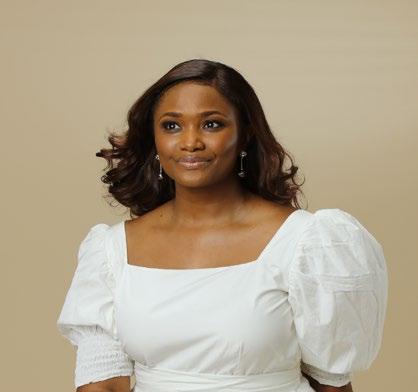
Every year, on March 8, we celebrate International Women’s Day with different themes. This year, the theme is Accelerate Action, emphasising the urgency of removing structural obstacles that prevent women from advancing.





According to the International Women’s Day website, “at the current rate of progress, it will take until 2158, which is roughly five generations from now, to reach full gender parity, according to data from the World Economic Forum.”
Our cover personality is Arese Ugwu, an author and advocate for financial literacy who is slowly changing how women around Africa and the rest of the world think about their finances. Through her best-selling book The Smart Money Woman, which she also made into a successful TV series, she has been able to arm women with information about managing their finances.
Read Arese Ugwu’s interview on pages 8 to 10.
Have you ever wondered if there are women-centric clubs around the world? In honour of International Women’s Day, we have listed some of them you should know about. Most of them are a haven for women to network and get support from other women. Scroll on to page 14 for this.
You may want your perfume to last from morning till nightfall, but sometimes, the fragrance fades away after a few hours. Do not worry; we have some hacks to help your fragrance last longer. You’ll find this on page 12.
Don’t forget to click on the instructions below the QR codes on page 16 to download our playlist. The selection will have your head bopping in no time.
Until next week, enjoy your read.







SUNDAY, MARCH 9, 2025
THEWILL NEWSPAPER • www.thewillnews.com


SUNDAY, MARCH 9, 2025


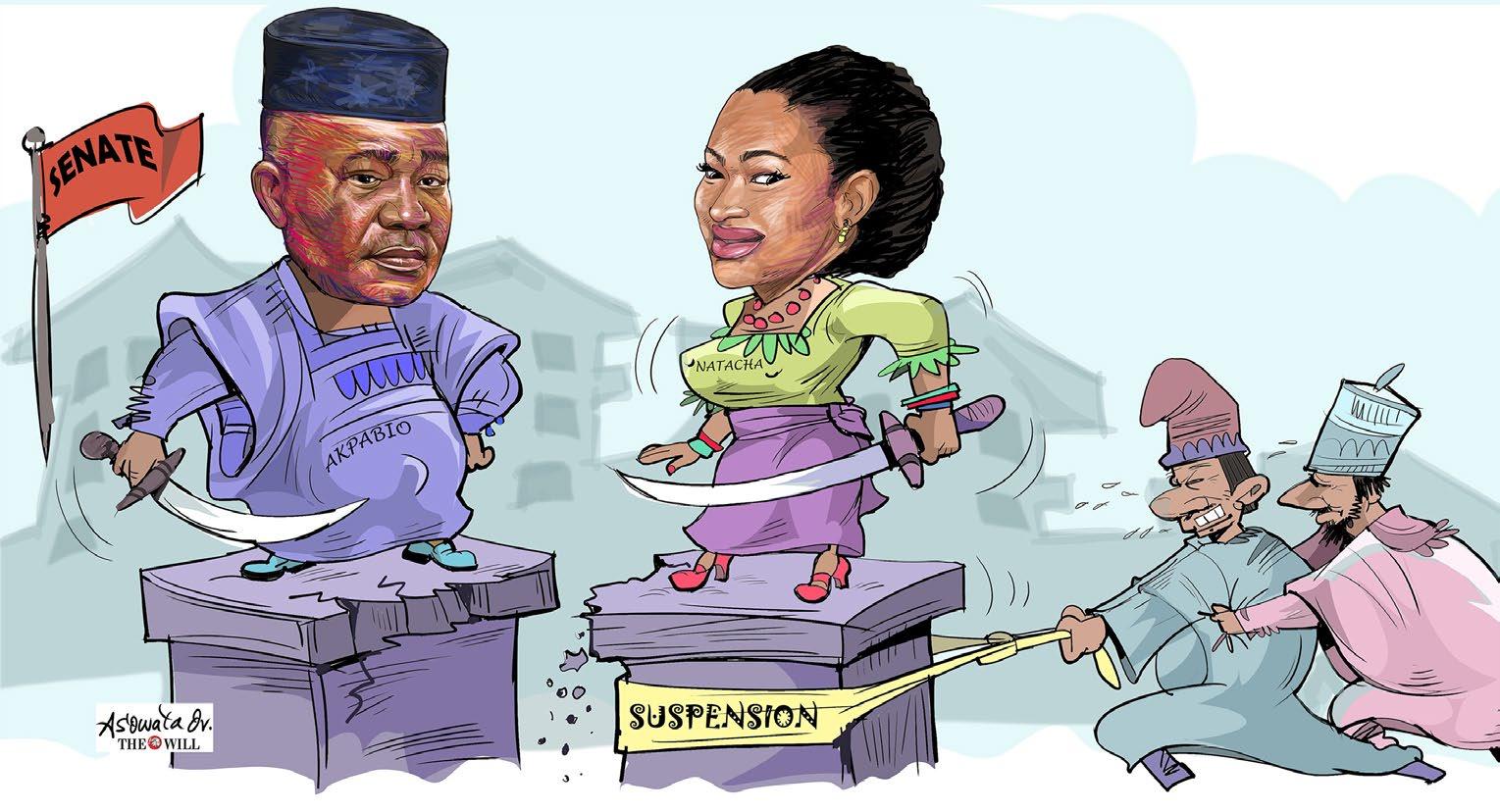
BY AMOS ESELE
After a spell of heated public debates, protests and drama over Senator Natasha Akpoti-Uduaghan’s allegations of sexual harassment, abuse of office and malicious obstruction of legislative functions, levelled against President of the Senate, Godswill Akpabio, everything comes down to the question of the rule of law.
“It is now a matter of dispute. Under our laws there is division of labour. And in that division of labour, the courts are the ones vested with the power to settle disputes between government and individuals, individuals and institutions, as well as between persons,” Dr Ehiogie West-Idahosa, a Senior Advocate of Nigeria, SAN, told THEWILL during an interview on Friday.
A two-time former member of the Federal House of Representatives, Dr West-Idahosa said the framework of the law in Nigeria is such that though there are three mutually interdependent arms of governance, “If the Constitution did not want the court to be involved in matter of disputes involving lawmakers, it would not have Section 4 (8), which states that the legislative activities of the National Assembly shall be subject to the decision of the court. That is one. Two, the Senate by its own rules also has a submission, which says that the Senate shall not debate any matter pending before a court in such a manner as to prejudice the outcome of the pending matter. Remember, the law says any matter. So, if a Senator took the Senate to court, it would be a pending matter.”
Tomorrow, Monday, March 10, 2025, the Federal High Court presided over by Justice Obiora Egwuatu, which had on March 5 restrained the Senate Committee on Ethic, Privileges and Public Petitions from conducting disciplinary proceedings against Senator Akpoti-Uduaghan, will hear from the defendants why the applicant’s reliefs should not be granted.
Justice Egwuatu issued the order, following an ex parte application filed by Akpoti-Uduaghan’s counsel.
The Senator representing Kogi Central at the National Assembly had been invited to appear before the senate’s disciplinary committee on March 6, following a dispute with Senator Akpabio on February 20, 2025. That day she protested the reassignment of her seat by Senator Akpabio, in what Senators say was a violation of Standing Rules 2023 (as amended). However, on March 5, she had submitted the petition to the Committee, alleging sexual harassment, abuse of office and malicious obstruction of her legislative functions by Senator Akpabio.
According to the pending suit, Senator Akpoti-Uduaghan prayed that the court grant an order restraining the Senate and its ethics committee from “proceeding with the purported investigation” against her, and an order “declaring that any action taken during the pendency of this suit is null, void, and of no effect whatsoever”.
The Kogi senator also prayed for a court order permitting the defendants to be served with the originating summons and other documents through proxy.
But on March 6, with Akpabio presiding, she was suspended for six months by the Senate, following recommendations of its disciplinary committee for bringing the Red Chamber into disrepute by violating Standing Rules 2023 (as amended).
However, THEWILL notes that the Senate President should not be the presiding officer on any matter that is linked to the alleged sexual harassment claim made against him by Senator AkpotiUduaghan for equity and justice.
The committee recommended and the senate approved that Akpoti-Uduaghan should tender a written apology before resuming duty; that her office should be locked up for the duration and she hands over property belonging to the Senate; she must not come close to the National Assembly complex; that her salaries and allowances and security details be suspended and that she must be barred from presenting herself to local and international media.
“So, the main question to be answered now is whether an order made against an extant injunction should not be undone. We






that the court was to send them the papers. They then conveyed an emergency meeting at which the Chairman announced to the members that they had instruction to conclude the matter. It was at the meeting that they tried to change the date on the notice to her and at about 3:30 in the afternoon, they hurriedly sent her a notice that the hearing was no longer on the 6th but on the 5th. Do you know that by the time they sent the notice to her, they had concluded the business of the day? That is the truth of what I found out. I went out of my way to do so because the injustice was too glaring. The point I am making in all of these is that we should not mystify the parliament. Lawmakers are not above the law. That is why we have constitutional provisions which subordinate the National Assembly to the jurisdiction of the court.”
PRECEDING CASES
Professor of Constitutional Law, Maxwell Gidado, said that the law must take its course in this matter and considers the six months suspension order on Senator Akpoti-Uduaghan as “very drastic.”
As a scholar who was once on sabbatical at the National Assembly, Prof Gidado, who is a Senior Advocate of Nigeria, SAN, however, thinks that the Senate should have followed precedence and deal with the matter within rather than go to the court, which has ruled on similar matters in the past and ruled in favour of the applicants.
He told THEWILL at the weekend that since representation at the NASS is a constitutional matter, no elected member should be sanctioned for any offence in such a way that hinders their duty to their constituents. “There is an established number of days that lawmakers can be suspended from the legislature so that their constituents are not left without representation for too long. And there are precedents on this matter. Some of the cases involved Senator Ali Ndume from Borno South, Senator Abdullahi Ningi from Bauchi Central and Senator Ovie Omo- Agege, Delta Central.”
Gidado argued that as an institution of government, the Senate should be seen to conduct its affairs with more dignity. Ranking Senators should be ready to assist the new ones to learn the rules of the game and conduct themselves in civil language.
“Where you have ranking senators and principal officers making offending comments that portray their new colleagues in bad light, you are calling for trouble. But, like I said, there are precedents on this pending matter that ought to serve as a guide to actions.”
Prof Gidado’s recollections of cases of precedence similar to Senator Akpoti-Uduaghan suit, which were settled by the courts in the past abound in both chambers of the NASS. The first is the suit involving Senator Ali Ndume, Borno South. In 2017. Senator Ndume had accused the Senate under the leadership of Senator Bukola Saraki of importing a bulletproof Range Rover with fake documents.
Upon investigation, the Senate Committee on Ethics, Privileges and Public Petitions recommended Senator Ndume’s suspension for “failing to conduct proper investigation before making the allegations” and for “bringing the Senate to unbearable disrepute”. After the suspension, Senator Ndume approached a Federal High Court in Abuja over the matter. In November 2017, the court nullified the suspension and declared it “illegal, unlawful and unconstitutional”.
The court also ordered Senator Saraki and the Senate to pay the suspended senator all outstanding salaries and allowances. In a similar suit, Justice Nnamdi Dimgba of the Abuja Division of the Federal High Court on May 10, 2018, nullified the suspension of Senator Ovie Omo-Agege from the Senate. According to Justice Dimgba, the Senate’s decision to suspend Senator Omo-Agege, as well as the approach adopted by the National Assembly, was faulty constitutionally.
Senator Omo-Agege, who represented Delta Central, had approached the court, after the Senate’s committee on ethics and privileges began to investigate his comments in which he condemned the NASS’s decision to amend the Electoral Act in a design to alter the sequence of the 2019 General Election. The Senate committee investigated the matter and recommended the suspension of Senator Omo-Agege for 181 days, which was reduced to 90 days after a review was undertaken.
Ahead of his suspension, Senator Omo-Agege approached the court, challenging the decision of the Senate to investigate his allegations. Justice Dimgba said that though the Senate had a constitutional duty to discipline its members, such disciplinary measures must comply with provisions of the law. The judge noted that Section 4 (8) provided that the exercise of legislative powers was subject to the decisions of the court, adding that the
cited provision stated that the Senate could not take a decision that would tend to oust the functions of the Judiciary.
According to Mr Dimgba, where the actions of the Senate are found to be in violation of constitutional provisions, the section 4 (8) becomes fully applicable by the Judiciary. He further ruled that constitutional provisions only allow the Senate to suspend its members for no more than 14 days.
The court therefore nullified Senator Omo-Agege’s suspension with immediate effect. It further ruled that all outstanding salaries and allowance be paid to the senator. Senator Abdul Ningi of Bauchi Central got a three-month suspension on March 12, 2024, but had his suspension lifted 75 days after.
interfere with the internal affairs of the legislature, provided such actions do not contravene the Constitution of the Federal Republic or fundamental rights of individuals.
In this case, Senator Akpoti-Uduaghan, he argues, was not punished but given an opportunity to be heard. “Instead of appearing before the Committee for hearing, she headed straight to court to stop the constitutional function of the Senate. She is absolutely wrong and the case will be dismissed ultimately.
“Similarly, in Hon. Dino Melaye v. House of Representatives (2002) 18 NWLR (Pt. 799) 67, the Court of Appeal held that the courts cannot intervene in disciplinary actions taken by the legislature against its members, as it falls within the exclusive powers of the legislature.


Just like in the Senate, the House of Representatives has had its fair share of rash suspensions in the NASS. The most celebrated case was the 2018 Abuja Federal High Court ruling which voided the 180-legislative-day suspension of Abdulmumin Jibrin. The House had suspended Jibrin in September 2016 because he reported cases of corrupt practices against its leadership to anti-corruption agencies.
Jibrin took the matter to court, where the judge ruled the suspension unlawful and unconstitutional and ordered the lower legislative chamber to pay Jibrin all the salaries and benefits owed to him during the period of his unjust suspension. As with all aforementioned cases, the court also ordered that the suspended lawmakers be readmitted because the NASS was wrong in suspending them indefinitely when the law only allows the suspension of erring members for 14 legislative days.
Dr Monday Ubani, a Senior Advocate of Nigeria, and former National Vice-President of the Nigerian Bar Association, is of the view that the court cannot stop the Senate Committee from investigating its members and in this case, Senator AkpotiUduaghan. He told THEWILL that all the cases cited as precedence may differ from the current matter involving the Senator from Kogi Central.
He said, “Precedents can differ based upon facts. What happened in one case cannot decide another. It is only when the matter comes up in court that we can look at the facts of the case and decide. Disciplinary action is part of the internal affairs of the NASS or Assembly. Why the exparte order? That the Senate should stop investigating its members? Well, this is a judicial thing. It will be handled by the lawyers. The question is whether the judiciary has a right to interfere in the internal mechanism of the Senate.
“This principle is rooted in the doctrine of separation of powers as enshrined in Sections 4, 5, and 6 of the 1999 Constitution of the Federal Republic of Nigeria (as amended), which vests legislative powers in the National Assembly, executive powers in the President, and judicial powers in the courts.”
Citing the Supreme Court in Senator Ali Ndume v. Senate of the National Assembly and Anor (2019) LPELR-46543(SC), Ubani said that the apex court upheld the principle that the courts should not
The
Senate, by its Order 64 rule, can only suspend a member for 14 legislative days. The same applies to the House of Representatives. So, the Senate cannot keep to their own rules and yet they are talking about rule, rule, rules
“However, the courts can intervene only if the legislature exceeds its constitutional powers, violates the fundamental rights of the individual concerned, or breaches the principle of fair hearing (Section 36 of the 1999 Constitution). For instance, if the Ethics and Privileges Committee acts ultra vires by imposing a penalty beyond its powers or denies Senator Akpoti-Uduaghan the right to a fair hearing, the court may intervene.
“As we can see, the Committee invited her in order to hear her own side of the story, but she chose to run to the court instead. The court as a different arm of government cannot stop the Legislature from performing its functions.” According to Dr Ubani, the Committee was right in ignoring the court order, going ahead with the investigation and making recommendations accordingly. He noted that a legal team assembled by the Senate will tackle the case in court by filing an application seeking the setting aside of the court order, if any.
Another Senior Advocate of Nigeria, Mr Kunle Edun, SAN cites Order 67(4) of the Senate Rules, which states that a senator can only be suspended for a period not exceeding 14 days. He said in a note published in a legal opinion journal at the weekend that he does not support with the suspension order on Senator AkpotiUduaghan.
“The courts have several times held that a legislator is a representative of his or her constituents and that by suspending a legislator it automatically translates to an unconstitutional denial of the constituents right to representation at the Parliament. She represented millions of her constituents who have just been unlawfully denied representation.”
He said, the contention that the court lacks the power to interfere in the affairs of the legislature by virtue of the principle of separation of powers is not enough for the Senate to disregard an order of interim injunction made by a competent court of law restraining the Senate and its committee from proceeding with the hearing. “All the reasons that the Senate may have in disobeying the court order ought to have been presented before the court as a basis to set aside the interim order. It is lawless for a legislature to disobey an order of court, whether valid or otherwise.”
“Senator Akpoti-Uduaghan rightly refused to appear before the Ethics Committee in view of the court’s order. The Senate was wrong in proceeding with the hearing despite the court order. That was sheer legislative rascality by the legislators. The Court should proceed to set aside the purported resolutions of the Senate.” Efforts to get reactions from the Senate Spokesperson, Senator Adaramodu Adeyemi failed. Multiple calls to his phone and messages went unanswered.
The Federal Government at the weekend waded into the matter. The Women Affairs Minister, Imaan Sulaiman-Ibrahim told State House Correspondents at the Presidential Villa, Abuja, that “It’s an unfortunate incident that should not happen. In the last assembly, we had nine senators that were women. We don’t want to lose any woman member in the Senate or decrease in the numbers. We’re going to be brokering peace. We’ll engage all the stakeholders to ensure that they temper justice with mercy.”
Suleiman-Ibrahim said she was emboldened by the Senate President’s openness to talk. “I was at the National Assembly yesterday, at the Senate where we marked the International Women’s Day. The last thing the Senate President said was that ‘we’re open to broker peace.’ So, we’re going to be the intermediary between the two parties to see that we broker peace for peace to reign and then we’ll continue to sensitise everyone so that we learn to work better together as men and women,” she said. There are four women in the current Senate - Senators Ireti Kingibe (FCT, Labour Party); Idiat Adebule (Lagos West, APC); Ipalibo Banigo (Rivers West, PDP) and Natasha Akpoti-Uduaghan (Kogi Central, PDP).
Restoration of National Theatre: Governor of the Central Bank of Nigeria (CBN), Mr. Olayemi Cardoso (m) flanked by two of his Deputies, Ms. Emem Usoro (Corporate Services) and Mr. Phillip Ikeazor (Financial System Stability), and members of the Bankers’ Committee after a tour of the iconic National Theatre, Iganmu, Lagos, renovated by the CBN in collaboration with the Bankers’ Committee on Thursday, March 6, 2025.

The National Union of Electricity Employees has strongly condemned the brutal attack on Ikeja Electricity Distribution Company workers by personnel from the Air Force Base, Ikeja, last Thursday.
General Secretary, Dominic Igwebike, NUEE described as unprofessional the actions of the military personnel, who took over the Corporate Headquarters of Ikeja Electric, IE, and its Oshodi Business Unit.
He said, “On resumption of duty this morning, some military personnel from NAF Ikeja Base invaded the Corporate Headquarters and Oshodi Business Unit offices of the company, beating up and molesting every staff member they encountered.
“They destroyed personal effects such as phones, laptops, vehicles, doors, office equipment, and gadgets.The invasion took place simultaneously at the company’s Corporate Headquarters and Oshodi Business Unit offices.
“They took away the Oshodi Business Unit’s Commercial Manager and 13 drivers in their pickup work vehicles, torturing them and treating them like criminals. They unleashed terror on our members.
“The military carried out this brutal and barbaric action against our innocent members because they were disconnected by the company due to non-payment of their huge outstanding debt.
“We unequivocally denounce this dastardly act from the military and demand the immediate release of our affected members, an undertaking from the IE Management, the Federal Ministry of Power, and the Ministry of Defence to protect our members from any further traumatizing experience of this nature, by calling the military to order.
“Moreover, we demand that all staff properties that were taken or destroyed be replaced and that those beaten be given adequate medical treatment.
At press time, sources said that though the 15 workers had been released, they were in serious pain as their wounds had not been treated.
Their phones, laptops, and other personal effects that were not destroyed had not been returned to them. However, the company vehicles were released.
Reacting to the development and its impact on the industry, Adetayo Adegbemle, Executive Director of PowerUp Nigeria, said: “I believe what the Air Force personnel did is barbaric and should never be encouraged.
“There should be consequences for the personnel involved, as our military is supposed to be a professional one. Ikeja Electric should also institute legal action against Sam Ethnan Barracks.
“There are civil and professional ways to deal with issues, and we should always seek conflict resolution alternatives.”
In his reaction the spokesperson for the Association of Nigerian Electricity Distributors, ANED, Sunday Oduntan, said: “The various branches of the military, including the Army, Air Force, Police, Navy, and others, owe billions of Naira. Almost all of them are classified under Band A and enjoy many hours of power supply but refuse to pay despite several appeals.
“We even offered to provide prepaid meters to the Air Force barracks, but they refused to accept them. Now, they have invaded our premises and manhandled our staff, customers, and journalists. “This is truly sad. These people must be held accountable and face justice.”
Recall that on March 3, NAF raised alarm about a prolonged blackout at its Ikeja base, which had been without stable electricity for 12 days despite consistent payments to Ikeja Electric.
BY JOSEPH AMEDU, LOKOJA
The Ohinoyi of Ebiraland, His Royal Majesty, Alhaji Tijani Ahmed Anaje, has officially endorsed the Kogi AGILE (Adolescent Girls Initiative for Learning and Empowerment) project, giving his royal blessings and emphasizing its importance in improving education and empowerment opportunities for young girls in the state.
Speaking at his palace in Okene, the revered monarch commended the initiative, describing it as a transformative step toward enhancing access to quality education, particularly for adolescent girls in Ebiraland and Kogi State at large. He expressed deep appreciation for the government’s commitment to addressing challenges that hinder the education and empowerment of young girls, ensuring they have a brighter future.
His Royal Majesty, in his words of admonition, urged community members, parents, and stakeholders to embrace the project wholeheartedly. He stressed the need for collective effort in ensuring its success, noting that the education of girls is fundamental to the progress of society.
“The AGILE project is not just a policy; it is a vision for the future of our daughters and our land. Education remains the bedrock of development, and no society can truly advance if its girls are left behind. I urge our people to support this initiative fully,” the Ohinoyi stated.
Furthermore, the monarch assured that he would take active steps to sensitize other royal fathers across Ebiraland, ensuring the message reaches every corner of the region. He reiterated his commitment to working closely with relevant authorities to foster the smooth implementation of the program.
“Consequently, our members are advised to stay away from the office until further notice because we cannot work under brutality, intimidation, and threat to life.
“Until the safety of lives and property is assured, we will have no choice but to withdraw our services nationwide until we are guaranteed safety and protection at the workplace.”
NAF had warned that the prolonged blackout was exposing sensitive military equipment, including bombs and rockets, to dangerously high temperatures, raising fears of a potential explosion.
“These bombs are not meant to be exposed to extreme heat. The longer this blackout continues, the higher the risk of an explosion,” NAF stated, referencing the 2002 Ikeja Cantonment bomb blast.
The endorsement by the Ohinoyi of Ebiraland is expected to encourage community-wide participation and create a ripple effect of support among other traditional leaders and local authorities, thereby driving the success of the AGILE initiative in the state. Earlier in his opening remark, the Project Coordinator of Kogi AGILE, Dr. Abdulhakeem Bello, expressed gratitude for the royal endorsement, emphasizing that the support of traditional institutions is crucial for the success of the initiative.
He noted that the project aims to remove barriers that prevent adolescent girls from accessing and completing secondary education, especially in rural communities.
He stated that with the backing of the Ohinoyi and other traditional leaders, awareness about the AGILE project would significantly increase, ensuring that more families allow their daughters to pursue education without hindrance.




L-R: Chairman, NDDC Board, Mr. Chiedu Ebie; Managing Director, Dr. Samuel Ogbuku; Governor Hope Uzodimma of Imo State; Minister of Regional Development, Eng. Abubakar Momoh and NDDC Executive Director, Projects, Hon. Victor Antai, during the inauguration of the reconstructed 7.6km EziamaAbba-Owere Nkworji road in Imo State on Mach 6, 2025.


BY AMOS OKIOMA
The Bayelsa State Government has announced the indefinite suspension of the rerun election scheduled for Saturday, to produce a substantive President of the state chapter of Ohanaeze Ndigbo.
It also announced the total disbandment of the Electoral Committee that conducted the election on February 23, 2025, that ended in a stalemate, saying the committee fell short of expectations in the performance of its duties.
Speaking at a meeting with leaders and stakeholders of Ohanaeze Ndigbo in the state at the Government House, Yenagoa, at the weekend, the Deputy Governor, Senator Lawrence Ewhrudjakpo, warned those planning to participate in the rerun election to have a change of mind in their own interest.
The Deputy Governor, in a statement by his Senior Special Assistant on Media, Mr Doubara Atasi, at the weekend, explained that the state government decided to intervene to promote peace and harmony among the Igbos in Bayelsa, as well as forestall the breakdown of law and order.
According to Senator Ewhrudjakpo, the government has already given directive to security agencies to arrest and prosecute whoever that violates its directives bordering on the election of the state president of Ohanaeze.
He acknowledged the supportive role being played by Igbos in the development of Bayelsa and urged them to continue to live as brothers and sisters and never allow the issue of electing a new leadership to divide them.
He said, “As a government, we appreciate what you have been doing for our state. You are outstanding and that is why we respect you. This is the first time we are meeting again after our second term election. So, let me on behalf of the governor and myself, thank you for supporting us.
“We are not taking your support for granted. That is why for the first time in the history of this state, one of you, an Igbo son, is appointed as commissioner who sits with the governor at the state executive council to make decisions.
“Coming back to the issue that has brought us here, what do the Ohanaeze Ndigbo want? Would you allow the
election of your leader to polarise and destroy Ohanaeze Ndigbo in Bayelsa? Our answer is No, So for now, the government’s position is that rerun is suspended indefinitely.
“On Saturday, the security agencies will be deployed round; So, anybody who gathers in the name of doing Ohanaeze election in this state will be a guest to the Police or DSS.
“Government will not impose any candidate on Ohanaeze, but the government will ensure that there is peace and tranquility. We want to see how we can reconcile you people. On that note, we are setting up a reconciliation committee now.”
Senator Ewhrudjakpo, who assured the Igbos that the government would do everything within its reach, including adopting the “Doctrine of Necessity” to address the lacunas in their constitution to achieve amicable resolution of the current logjam. To this end, he constituted a reconciliation committee to look into the issues causing the dispute and come up with recommendations within the next two weeks to enable the government settle the misunderstanding.
Earlier in their submissions, the two candidates contesting the position of Presidency of Ohaneze Ndigbo in the state, which is zoned to Anambra State, Dr Frank Odinekwe, and Dr Anthony Olikagwu, appealed to the state government to help the sociopolitical organisation resolve its internal conflict.

Responding on behalf of the Reconciliation Committee, the Chairman and Special Adviser to the Governor on Political Matters, High Chief Collins Cocodia, expressed gratitude to the Deputy Governor for finding them worthy for the assignment and pledged to work hard to achieve the committee’s purpose. Members of the Committee include the Senior Special Assistant to the Deputy Governor on Political Matters, Mr Didi Engineerkeme; and the Director of Human Resources Management, Deputy Governor’s Office, Mr Ebi Wilson.
Other members are the traditional Prime Minister of Igbos in Bayelsa, High Chief Obiedo Nwankwo, Mr Ikechukwu Nweke, and Mrs Sarah Ngozi Okonkwo.
BY JOSEPH AMEDU, LOKOJA
The Commissioner of Police in Kogi State, Miller G. Dantawaye, has reiterated the commitment of the Nigeria Police Force to ensure the safety of lives and property in the state.
The Commissioner gave the assurance when he paid a courtesy visit to His Royal Majesty, the Obaro of Kabba, where he sought the monarch’s blessings and collaboration for effective implementation of Community Policing through intelligence gathering to enhance security in Okun Land.
Addressing the Obaro of Kabba, The Olujumu of Ijumu, The Elulu of Mopa and other Royal Highnesses, CP Dantawaye emphasized the importance of Community Policing, urging traditional leaders, farmers, and residents to provide timely and accurate information to Security Agencies.
He acknowledged the critical role of the Local Population in combating crime and maintaining law and order.
In response, the Obaro of Kabba, Oba Solomon Dele Awoniyi requests for enhance security presence in Kabba and it’s environs.
The monarch highlighted the need for adequate security measures to assures his subjects of their safety as they go about their lawful businesses and activities. He commended past security operations that had made impact in Okun Land, but required sustained efforts for long-term peace.
He appealed to the Police Command to take decisive action to improve security in the area and called for the establishment of a Police Division in some parts of Okun Land to bolster security presence.
Following the meeting at the Obaro Palace, CP Dantawaye proceeded to Ayere Divisional Police Headquarters to assess the facility and encourage personnel deployed and to enhance Community Policing approach as they perform their duty in the area. He commended the Divisional Police Officer (DPO) and personnel for their dedication to duty and reaffirmed his support in improving their welfare.
The CP also paid a courtesy visit to His Royal Highness, the Alayere of Ayere Land, where discussions centered on strengthening security measures in the area. The monarch pledged his full cooperation with the Police and promised to talk to his subjects on the need to collaborate with the Police to secure the area.
He said the Command remains steadfast in its resolve to protect life and property and urges all citizens to collaborate with law enforcement agents by reporting suspicious activities promptly.


L-R: Senior Gender & Economic Inclusion Advisor, Africa, IFC, Adaorie Udechukwu; Chief Talent Officer, Coronation Group Ltd, Pai Gamde; Senior Special Assistant to the President Bola Tinubu on Entrepreneurship Development in Communication, Innovation, and Digital Economy, Chalya Shagaya; Joke Silva; CEO, NGX, Jude Chiemeka; GCEO, NGX Group, Temi Popoola; Minister for Arts, Culture, Tourism and Creative Economy, Hannatu Musa Musawa; Vice Chancellor, University of Lagos, Prof. Folasade Ogunsola; Group Chairman, NGX Group, Alhaji (Dr.) Umaru Kwairanga; Director-General, Securities and Exchange Commission (SEC), Dr. Emomotimi Agama; Group CEO, Future View, Elizabeth Ebi; Director, NGX Group, Ojinika Olaghere and Divisional Head, Business Services and Client Experience, CSCS Plc, Onome Komolafe, during the IWD celebration at the Exchange in Lagos on March 7, 2025.

BY JOSEPH AMEDU, LOKOJA
Media Rights Agenda (MRA) at the weehend called on media stakeholders to take urgent steps to empower female journalists to play more prominent roles in newsrooms, editorial leadership, and decision-making spaces within the media sector, urging them to create environments where such journalists can thrive without fear of harassment, discrimination or violence.
In a statement issued ahead of the commemoration of this year’s International Women’s Day on March 8, MRA’s Programme Officer, Ms Ayomide Eweje, noted that despite the multiplicity of challenges confronting female journalists, including gender inequality, safety concerns, and limited leadership opportunities which continue to hinder their full participation in the media industry, they have nonetheless made invaluable contributions to the development of the Nigerian society through their efforts to inform and educate members of the public as well as hold those in power accountable.
Ms Eweje said: “Despite their critical role in strengthening democracy and amplifying marginalized voices, female journalists in Nigeria continue to face threats, harassment, and violence, both online and offline,” adding that “a collaborative effort between media houses, civil society organizations, government agencies, and the public is crucial to ensuring the safety and well-being of female journalists.”
Observing that women in the media play an important role in ensuring the diversity of voices and opinions as well as fostering a more inclusive media
landscape, she stressed that the increasing incidents of intimidation, harassment, cyberbullying and other forms of attacks against women in the media underscore the urgent need for stronger legal protections, institutional safeguards, and collective action to combat impunity for these actions, many of which constitute criminal offences for which no one is ever held accountable.
Ms Eweje noted that ensuring the safety of female journalists in Nigeria requires a multi-faceted approach that addresses both physical and digital threats, as well as systemic barriers to their protection, including enforcing existing laws that protect journalists and adopting gender-sensitive policies that address violence against female journalists; providing cybersecurity training to help female journalists navigate online threats; ending impunity for crimes against journalists by ensuring swift investigation and prosecution of perpetrators; and implementing initiatives to ensure greater representation of women in leadership roles within the media industry.
She said: “We must challenge systemic biases that limit the growth of female journalists and create environments where they can thrive without fear of harassment, discrimination, or violence. Media organizations and media professional bodies must commit to gender-inclusive policies, including those that address workplace harassment; create mechanisms for swift action when female journalists are threatened; and ensure equal opportunities for women to lead and influence the profession.”
BY SAMPSON UHUEGBU
One of the foremost humanitarian organizations in Nigeria, Ejike Chukwu Foundation, has congratulated women on this year’s International Women’s Day (IWD) celebration; and therefore commended them for showing resilience.
In a release from the foundation, under the leadership of the founder and the Chief Executive Officer, Dr. Ejike Lucky Chukwu, MON, FCAI, “On this International Women’s Day, we celebrate the resilience, strength, and extraordinary achievements of women across the world”.
Dr. Chukwu, who has empowered over 100,000 women and girl
child through the Ejike Chukwu Foundation, also noted, that from leaders in science, politics, and the arts to everyday heroes in the families and communities, women, according to him, have continued to shappen the world with courage, creativity, and compassion.
“This year, we reflect on the journey of women’s rights and the ongoing battle for gender equality. While there has been progress, we acknowledge that there is still much work to be done”, he said. It is on record, that the Ejike Chukwu Foundation has also empowered youths, footed hospitals’ bills for the indigents, taking care of people living with disability (PLWD) and others.
BY FELIX IFIJEH
President Bola Tinubu has appointed six Chief Medical Directors (CMDs) for federal government-owned hospitals in Akure, Gombe, Azare, Lafiya, Maiduguri, and Kafanchan. Bayo Onanuga, the Special Adviser to the President on Information and Strategy, announced the appointment in a statement on Friday.
The newly appointed CMDs include:
1. Prof. Olusegun Sylvester Ojo has been appointed Chief Medical Director of the Federal Teaching Hospital, Akure, Ondo State. Ojo, who previously served as the pioneer Chief Medical Director of the Ondo State Specialist Hospital, is a seasoned medical professional.
2. Prof. Yusuf Mohammed Abdullahi has been reappointed as the Chief Medical Director of the Federal Teaching Hospital, Gombe, following an outstanding performance during his first term. His reappointment underscores his exceptional leadership and contributions to the hospital’s growth.
3. Dr Dauda Abubakar Katagum, the Acting Chief Medical Director of the Federal Teaching Hospital, Azare, Bauchi State, has been confirmed as the substantive CMD.
4. Dr Ikrama Hassan has been appointed as the Chief Medical Director of the newly upgraded Federal Teaching Hospital in Lafiya, Nasarawa State. A consultant physician, Dr Hassan, previously served as the Medical Director of the Dalhatu Ibrahim Arab Specialist Hospital before its elevation to a teaching hospital.
5. Dr Ali Mohammed Ramat, a renowned Consultant orthopaedic and Spine Surgeon, has been appointed Chief Medical Director of the newly established National Orthopedic Hospital in Maiduguri, Borno State.
6. Dr Haruna Abubakar Shehu, a Consultant Family Physician, has been appointed Chief Medical Director of the newly established Federal Medical Centre, Kafanchan, Kaduna State. While all appointments are for four years, effective from the respective dates of assumption of office. Prof. Yusuf Mohammed Abdullahi’s second and final term as CMD of the Federal Teaching Hospital, Gombe, commenced on September 5, 2024.
Dr .Dauda Abubakar Katagum’s tenure as CMD of the Federal University of Health Sciences Teaching Hospital, Azare, Bauchi State, took effect from December 6, 2024.
Congratulating the newly appointed and reappointed Chief Medical Directors, President Tinubu urged them to uphold the highest standards of professionalism, accountability, and service delivery in their respective roles. He reiterated his administration’s commitment to improving healthcare infrastructure and ensuring all Nigerians have access to quality medical services.



Director General, Energy Commission of Nigeria (ECN), Dr. Mustapha Abdullahi (r) presenting the Letter of Partnership for the 20,000 tons per annum Green Hydrogen Project, to the Managing Director, Noretek Energy Ltd., Mr. Edward Traore, during the latter’s collaboration visit to ECN Headquarters in Abuja on Thursday March 6, 2025.
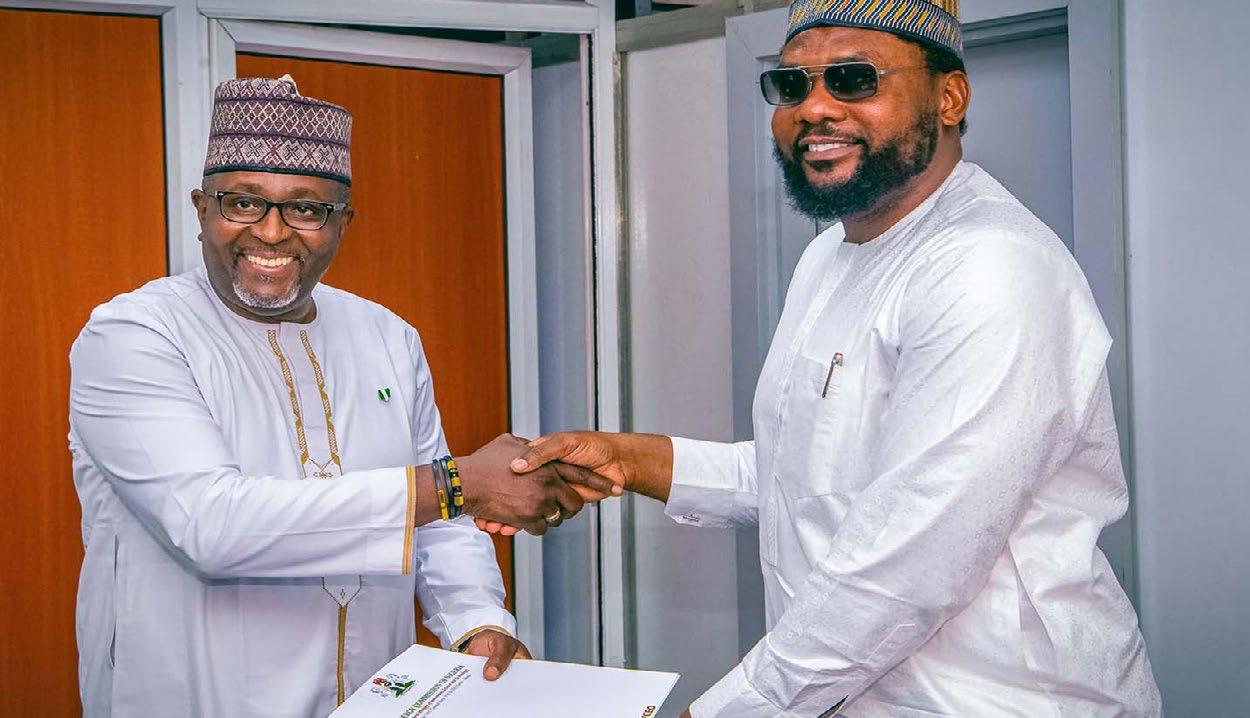
BY LADI DAPSON, MAIDUGURI
The National Human Rights Commission has begun gathering data on human rights violations and abuses affecting Internally Displaced Persons and refugees across four states in Nigeria’s North-East region.
The exercise, according to the NHRC, focuses on documenting cases of gender-based violence, sexual exploitation and abuse, restrictions on movement, family and social cohesion challenges, as well as psychosocial issues. The commission aims to use the data to improve protection services for displaced persons whose rights have been violated.
Speaking at the opening of a two-day training session for its staff and volunteer groups in Maiduguri, the Executive Secretary of the NHRC, Dr. Tony Ojukwu, said the initiative is being carried out in collaboration with the United Nations High Commissioner for Refugees.
The training, themed “Guidelines for a Human RightsBased Approach to Protection Referral for Forcibly Displaced Persons (FDPs), Asylum Seekers, Refugees, and Returnees,” is designed to enhance the capacity of community protection action groups on data collection and collation.
Ojukwu, who was represented by the commission’s Head of Monitoring, Mr. Okay Agu Benedict, noted that while preliminary assessments indicate widespread rights violations, the NHRC is working to establish the extent of
these abuses.
“What we know for now is that our needs assessment has shown that violations are taking place due to the vulnerable circumstances these people find themselves in. As we proceed, we will be able to provide more specific details,” he said.
The NHRC boss stressed the importance of accurate data collection in developing effective policies and interventions for IDPs, refugees, asylum seekers, and returnees.
“For our country to formulate any meaningful development plan for displaced persons, we must have reliable data on the violations and abuses they face,” he added.
Ojukwu further revealed that an initial assessment by the NHRC confirmed cases of rights violations in Borno, Adamawa, Yobe, and Taraba states, necessitating the current effort to document and address these issues.
A total of 54 participants, drawn from the four states, are being trained in data collection methodologies focused on human rights violations, particularly in cases of genderbased violence, sexual exploitation and abuse, movement restrictions, family and social cohesion challenges, and psychosocial concerns.
The Federal High Courts in Lagos and Yola, Adamawa State, have sentenced four drug kingpins—Ogbuji Christian Ifeanyi, Iloduba Augustine Chinonye, Shuaibu Nuhu Isa (aka Don), and Zidon Zurga—to a combined 95 years in prison for trafficking cocaine and cannabis (skunk) worth over N4.6 billion.
A statement issued on Friday, by Femi Babafemi, the spokesperson for the National Drug Law Enforcement Agency (NDLEA), revealed that Ogbuji was intercepted by operatives at Murtala Muhammed International Airport (MMIA), Lagos, on Wednesday, September 18, 2024, during the inward clearance of Ethiopian Airlines Flight ET 951 from Addis Ababa. He was found with 817 wraps of cocaine (19.40kg) valued at N4,656,000,000 (Four Billion Six Hundred and Fifty-Six Million Naira).
This arrest came barely 16 months after the 48-year-old businessman was convicted for ingesting 93 pellets of cocaine. Initially arrested at Nnamdi Azikiwe International Airport (NAIA), Abuja, on May 10, 2023, he was sentenced to two years’ imprisonment or a N3,000,000 fine by Justice Mobolaji Olajuwon of the Federal High Court, Abuja (Charge No. FHC/ABJ/CR/192/2023). Ogbuji paid the fine and was released.

The NHRC reiterated its commitment to strengthening protection mechanisms for displaced persons and ensuring their rights are upheld.
BY FELIX IFIJEH
President Bola Tinubu has appointed Professor Attahiru Muhammadu Jega, the former chairman of the Independent National Electoral Commission (INEC), as Special Adviser and Coordinator of the Presidential Livestock Reform.
Jega, former vice chancellor of Bayero University, co-chaired the Presidential Livestock Committee with President Tinubu.
The committee delivered comprehensive recommendations that underscored sustainable livestock reforms. One recommendation was the creation of the Livestock Ministry, which now has a minister. The President in a statement issued on Friday, by Bayo Onanuga,

his Special Adviser on Information and Strategy, hoped that Jega’s appointment will drive meaningful progress in the livestock sector and further strengthen national development efforts.
Jega, 68, is a member of the International Elections Advisory Council and the pro-Chancellor and Chairman of the Governing Council of Sa’adatu Rimi University of Education in Kano State. He served as the chairman of INEC between 2010 and 2015.
His appointment as special adviser to President Tinubu will reinforce the gains of the presidential committee and ensure the continued momentum of the reforms already in motion.
Undeterred, he was re-arrested at Lagos airport on September 18, 2024 and arraigned before Justice Yellim Bogoro of the Federal High Court, Lagos (Charge No. FHC/L/845C) on January 16, 2025. On 28 February 2025, he received five years’ imprisonment (with a N7,000,000 fine option) on count one and 10 years without a fine option on count two. Failure to pay the fine results in a 15year consecutive sentence. The court also ordered the forfeiture of monetary exhibits and items seized during his arrest.
Iloduba, 51, was arrested on New Year’s Eve, December 31, 2021, at Akanu Ibiam International Airport, Enugu, after ingesting 58 cocaine wraps. He excreted 48 pellets in transit and 10 in NDLEA custody. Convicted on March 5, 2025 (Charge No. FHC/EN/ CR/18/2022), Justice Folashade Giwa Ogunbanjo sentenced him to five years per count (10 years total, to run concurrently).
Shuaibu Nuhu Isa (55) and Zidon Zurga (50) were apprehended on November 25, 2024 on Numan-Yola Road with 500.8kg of skunk concealed in a Toyota Hilux (Lagos NT 829 AAA) and a Prado SUV (fake presidential plate: 01B-266 FG). Arraigned before Justice Bala Usman (Charge No. FHC/YL/150/2024), they were sentenced on February 7, 2025 to 35 years each (70 years combined) or a N25,000,000 fine each. Their vehicles were forfeited.
NDLEA Chairman/CEO, Brig. Gen. Mohamed Buba Marwa (Retd), commended the courts and prosecution teams for their diligence, particularly the MMIA Strategic Command (Lagos), Akanu Ibiam International Airport Special Area Command (Enugu), and Adamawa State Command.

BY FELXI IFIJEH
Governor Siminalayi Fubara’s promise to conduct a fresh local government election in Rivers State, in obedience to the recent Supreme Court ruling, has ignited a fresh controversy in the oil-rich state rather than calm frayed nerves. Indeed, the apex court made two judgements on the state over a week ago. The first one was on the conduct of the Local Government Election in the state on October 5, last year, which was won by the All People’s Party, APP. The second was to uphold a lower court ruling stopping federal allocations to the state.
On the October 5, 2024, local government election in Rivers State, a five-member panel of justices of the appellate court led by Justice Jamilu Tukur, declared the election invalid, null and void. It held that the poll was conducted in gross violation of section 150 of the Electoral Act 2022.
A Federal High Court in Abuja had on September 30, 2024, stopped the Independent National Electoral Commission, INEC, from releasing the Voter Register to the Rivers State Independent Electoral Commission, RSIEC, for the purpose of conducting the October 5, 2024 local government elections in the state.
The Special Panel of the Court of Appeal, Abuja, had in November, 2024, validated the council poll after it nullified the judgement delivered by Justice Peter Lifu of the Federal High Court in Abuja, which barred, INEC, from releasing the voter register to the RSIEC for the conduct of the local government election.
On stopping federal allocations to the state, the court upheld the order of Justice Joyce Abdulmalik of the Federal High Court, which barred the Central Bank of Nigeria (CBN) and the Accountant-General of the Federation from releasing statutory monthly allocations to Rivers State.
Justice Abdulmalik had in a ruling on October 30, declared the presentation of the 2024 budget by Governor Siminalaye Fubara before a four-member Rivers House of Assembly as an affront to the constitutional provision. The court had declared that the receipt and disbursement of monthly allocations since January 2024 by Governor Fubara, was a breach of the Constitution and an aberration. It restrained the CBN, the Accountant-General of the Federation, Zenith Bank and Access Bank from further allowing Fubara to access money from the Consolidated revenue account.
While the Special Panel of the Court of Appeal, Abuja, set-aside the order, saying that the Federal High Court lacked jurisdiction over the matter, it affirmed that issues related to state revenue should not be handled by federal courts. Ruling in an appeal challenging the decision on Friday, a five-member panel of the apex court led by Justice Emmanuel Agim, set aside the ruling of the Appeal Court, which vacated the High Court order.
Justice Agim held that contrary to the verdict of the appellate court, the Federal High Court had the requisite jurisdiction to entertain the suit the Amaewhule-led 27 lawmakers filed to challenge the continued withdrawal and expenditure of funds belonging to the state without the approval of the State Assembly.
The government, according to Commissioner for Information, Joe Johnson, said it would take action on the second ruling after it had secured and studied the Certified True Copy of the judgement. The reason for this pause in action is because there is a pending case at the Appeal Court on the defection of 27-lawmakers from the Peoples Democratic Party, PDP, to the All Progressives Congress, APC.

This unresolved defection has created a lacuna in the apex court ruling, which stakeholders see as legal and therefore one aspect of the solution to the crisis; while the other is political. That is why the pending case on defection at the appellate court ruling is being eagerly awaited.
Even so, a few days after Fubara ordered the local governments disbanded and the Chairman of the State Electoral Commission, retired Justice Adolphus Enebeli, held a meeting with political parties in the state and fixed August 9 for the conduct of a fresh poll, another round of crisis started.
Offended by that action, the Speaker of the House of Assembly, Martins Amaewhule issued a 48-hour ultimatum to Justice Enebeli and his commissioners to appear before it. The Assembly had to extend the ultimatum to March 10, 2025 following the failure of the RSIEC team to appear before it. In fact, Justice Enebeli’s lawyers did not help matters when it had to write the Speaker, Amaewhule, notifying him of the Assembly’s wrong choice of words and their autocracy in issuing an ultimatum in a democracy.
They said in their letter to the Speaker, “We respectfully suggest that both yourself and other legislators of the Rivers State House of Assembly undergo a re-orientation training workshop wherein you will be acquainted with the scope and ambits of your powers as a legislature as prescribed by the Nigerian Constitution. Our organisation offers to deliver any such training workshop at no cost to the Rivers State House of Assembly.”
Meanwhile, there are growing calls from the opposition for the impeachment of Governor Fubara, but it appears the Assembly is divided over the matter, particularly its pro-Wike faction. Following stern warnings from the Ijaw Youths Council, IJC, militant group, the Niger Delta Rescue Movement, threatened to attack oil installations in response to the ongoing political crisis and the alleged withholding of the state’s federal allocation. The group also issued a warning to non-indigenes in the state, urging them to leave for their safety, as they claimed hostilities were imminent.
Tension within the Assembly boiled over during a recent plenary session in which a proposal to extend a 48-hour ultimatum issued to the governor to get the required response. The lawmakers had issued two ultimatums to the governor to represent the 2025 budget and also to sack its
commissioners, both of which were cleared by the five-man Assembly led by Victor Oko-Jumbo.
The ensuing division among them deepened when one lawmaker’s attempt to push for immediate impeachment proceedings was met with strong resistance, particularly from his colleagues representing the Ijaw ethnic group, who vehemently opposed the move. This sparked a heated argument among the lawmakers.
As a result, many of the lawmakers are said to be reading some other motive into the intentions of their senior colleagues. Some even suspect that the impeachment bid was not merely an attempt to remove Governor Fubara, but rather part of a larger political strategy to bolster the governorship ambitions of Martin Amaewhule, an Ikwerre son from Obio/Akpor.
For this reason, lawmakers of Ijaw descent have been subtly condemning the impeachment move, which they think is part of the plan by the apparently winning group in the ongoing supremacy battle between Wike and the governor to gain power and control.
Meanwhile, the governor has responded to the Assembly’s orders. In a letter written to the Speaker through the Secretary to the State Government, Dr Tammy Danagogo,on February 6, 2025, the governor stated that neither he nor his deputy had seen or received any letter indicating a 48-hour ultimatum issued by the lawmakers loyal to Wike.
In response to threats by the militant group, the Police Command in Rivers State has vowed to crack down on any threats to national security, insisting that no group has the monopoly of violence. The Commissioner of Police, Olugbenga Adepoju, assured residents that security forces were prepared to contain any disruptions, warning that law enforcement would not tolerate attempts to destabilise the state.
Adepoju dismissed the threats by the militants or others, saying the police were equal to the task. He stated, “You see, we are taking this thing one step at a time. Nobody has a monopoly of violence. If fire is coming from heaven, it will not consume only one person. Definitely everybody will be consumed. “So, nobody can threaten anybody. We are handling the situation the way we should and we are ready for anything that is going to come.
“All eyes are on Rivers State now. I don’t think there is any problem here really, but we will not allow anybody to heat the polity. “You cannot fight the government and the governor himself has been handling the situation very maturely and well. So nothing will happen. The man on the ground (governor) is peaceful and God is on the throne and we are equal to the task.”
You cannot fight the government and the governor himself has been handling the situation very maturely and well. So nothing will happen. The man on the ground (governor) is peaceful and God is on the throne and we are equal to the task “


Operatives of the National Drug Law Enforcement Agency finally nabbed a wanted 59-year-old international drug baron, Ogbonnaya Jeff, after 17 years of dodging its officials. He was reportedly arrested at his den in the Ojo area of Lagos State last week, thus bringing to a close the dangerous activities of one of the most wanted drug lords in Nigeria with global reach for his toxic products.
According to the Chairman/Chief Executive Officer of NDLEA, Brig. Gen. Buba Marwa (retd.), who announced Ogbonnaya’s arrest by the agency’s Special Operations Unit last month at his hideout at No. 3, Ibukunoluwa Taiwo Close, off LASU Road, Ojo, Lagos, the drug lord is wanted across the world as the ringleader of a drug trafficking organisation responsible for smuggling narcotics into the People’s Republic of Korea.
Ogbonnaya is a notorious drug lord who recruited young Nigerians as couriers to smuggle illicit substances into the Republic of Korea (South Korea), in addition to being a trafficker of many other Nigerians arrested outside Nigeria for drug-related offences. Besides, laundering drug proceeds through the importation of electronics and other goods, were part of his elaborate plan to conceal his shady deals.
Apart from South Korea, other countries within the reach of the baron’s syndicate are Cameroun, Ghana, Burkina Faso and other East and Southern Africa countries.
General Marwa said that investigation revealed that while residing in Nigeria, Ogbonaya directed his drug couriers, Santa Elizabeth Pieterse and Carl Yohan Stephan Brisman, to smuggle a total of five kilogrammes of methamphetamine into South Korea through overseas flights between December 2023 and April 2024. In recent times alone, he has sent illicit drugs worth over N1.4 billion in street value to South Korea.
An INTERPOL Red Notice was issued for his arrest and extradition to the country for offences committed between 2023 and 2024.
The point in all of these is that for the NDLEA and its partners to have stayed on this case for 17 years and finally made the arrest is a salutary step in the war against illicit drugs. Also, it shows how commitment and dedication on the part of the NDLEA and its partners to the eradication of illegal drugs can achieve a lot in the long run. This kind of partnership, besides helping the parties to focus on their mission, also helps in putting the issue on the front burner of public attention and discourse with a view to creating awareness to the danger of illicit drugs and ever ready presence of wilful traffickers.
Indeed, relevant bodies like the United Nations Office on Drugs and Crime (UNODC) lists Nigeria on its website as one of the transit routes for many illicit drug and dangerous traffickers with the presence of hard drugs, such as cocaine, heroin and amphetamines readily available on the streets and abused by many.
NAFDAC rcently invaded Onitsha in Anambra state and Aba in Abia state where other forms of food and drugs were either being adulterated or made for consumption by an unsuspecting public. To compound the matter, what is happening in the country has become a Continental challenge.
Back home, however, the problem is compounded by the increasing crime rates and insecurity as well as severe health challenges and cognitive abilities which maintain a symbiotic relationship with drug prevalence. Even so, the NDLEA has consistently been on the trail of drug traffickers and couriers week in week out to the extent that this arrest of Ogbonnaya must remain a testament to its dedication and competence in the sustained war against illicit drug trafficking in the country. We salute Gen. Marwa and his capable team at the NDLEA for this significant break in the ongoing war on illicit drugs in the country and urged them to keep the fight alive.

General Marwa said that investigation revealed that while residing in Nigeria, Ogbonaya directed his drug couriers, Santa Elizabeth Pieterse and Carl Yohan Stephan Brisman, to smuggle a total of five kilogrammes of methamphetamine into South Korea through overseas flights between December 2023 and April 2024. In recent times alone, he has sent illicit drugs worth over N1.4 billion in street value to South Korea
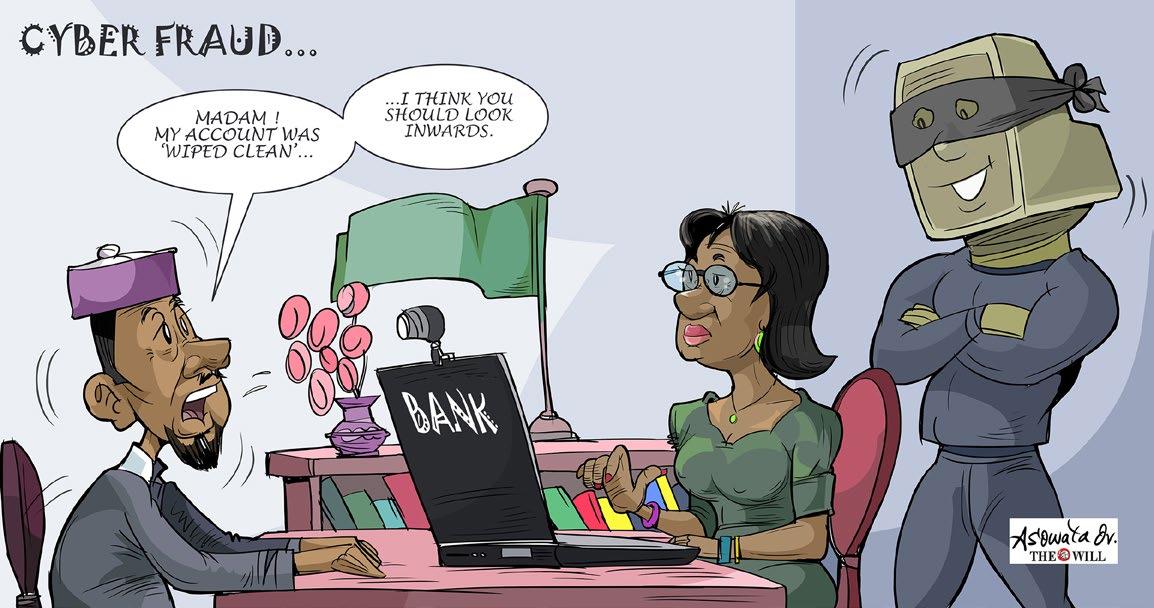




BY YAKUBU DATI
The hardest thing in the world to understand is the income tax”- Albert Einstein. That was the case with the Tax Reform Bill in Nigeria until it got to the National Assembly, where more people were made to understand the nitty-gritty of the bill, as opposed to relying on speculations by those who did not understand what the bill was all about. One can say without equivocation that the dust raised by the initial introduction of the Tax Reform Bill is gradually settling down as the grey areas and concerns raised by Nigerians are being addressed through a legislative process.
After receiving the bills, the National Assembly got down to brass tacks, taking holistic and unbiased views of the bills to establish the grievances of people and determine the issue that engendered fears and apprehensions. One of the ways the National Assembly achieved this was through the conduct of public hearings where members of the public were allowed to air their views and make inputs into the bills.
The House of Representatives organised a three-day public hearing on the Tax Reform Bill by the House Committee on Finance, ably led by Rt. Hon. James Abiodun Faleke. The forum provided a veritable platform for key stakeholders to air their views and contribute to strengthening the bill, while the chairman made the session lively and participatory with his mature interventions and democratic posture.
This led to a successful public hearing, after which the House of Representatives Committee on Finance began analysing the various submissions it received regarding the Tax Reform Bill.
Stripped of the misconceptions and initial assumptions, the bill , the committee pointed out, were meant to foster economic growth and investment through lower corporate tax rates, encouraging business expansion, as well as attracting foreign and domestic investors.
This is in cognisance of the fact that the tax incentives it will accord small businesses will boost entrepreneurship and lead to job creation and economic diversification as the simplified tax processes reduce administrative burdens, allowing businesses to focus on productivity rather than compliance complexities. At the public hearing, while observations raised by participants were duly noted, the overriding benefits of Increased government revenue for

development through a broadened tax base that ensures more people and businesses contribute to national revenue and reducing over-reliance on oil and external borrowing were factored in.
The process made it possible for people to see that the bills were about efficient tax collection mechanisms which would minimise evasion and leakages and ensure funds are available for infrastructure, education, and healthcare. It also opened the eyes of the people to the other advantages, which include the reduction of income Inequality through progressive taxation policies that ensure higher earners contribute more, while low-income earners get relief through exemptions.
Now, most people are clear that VAT exemptions on essential goods and services protect vulnerable populations from increased living costs and that tax reforms engender Inflation Control and Economic Stability.
It was also established through the deliberations that balanced tax policies help manage inflation by preventing excessive consumer price hikes, while fiscal responsibility through improved revenue mobilisation reduces government borrowing, stabilising the economy. As observed by experts, a revised VAT revenue-sharing formula promotes equity in resource allocation, ensuring that all states benefit and puts a lie to the claim that only Lagos and Rivers states would benefit.
STRIPPED OF THE MISCONCEPTIONS AND INITIAL ASSUMPTIONS, THE BILL, THE COMMITTEE POINTED OUT, WERE MEANT TO FOSTER ECONOMIC GROWTH AND INVESTMENT THROUGH LOWER CORPORATE TAX RATES, ENCOURAGING BUSINESS EXPANSION, AS WELL AS ATTRACTING FOREIGN AND DOMESTIC INVESTORS
People have come to appreciate the fact that reforms empower states to generate more revenue locally, fostering financial independence and reducing reliance on federal allocations and that a well-designed Tax Reform Bill is more than just a policy but a tool for sustainable progress. By making taxation fair, efficient, and growth-oriented, people have come to accept that these reforms create an environment where businesses thrive, public services improve, and economic stability is achieved.
As the committee spends sleepless nights fine-tuning the Bills, Hon Faleke expresses confidence that at the end of the exercise, more people will come to appreciate the genuine intentions of the bills and give kudos to President Bola Ahmed Tinubu for his initiatives towards improving the economy of the country.
BY IMOBO TSWAM
Mallam Nasir el-Rufai, the immediate-past governor of Kaduna state, is in the news, again.
I wish to state, upfront, and boldly too, that he is not an accidental critic. He has the history. I state, also, that this piece has no caveats. For sure, the man excites our emotions for reasons sublime, and reasons, bizarre. While some cannot stand his brand of politics or his forceful speechifying, others find it difficult reconciling his mega ideas and his lion-style courage with his petite frame. Yes, he has a small frame, but it is not many big-bodied people believe that small-framed men should be loud or dare to hog headlines for weeks on end in their presence. Plus El-Rufai has an ascerbic tongue which, when trained on opponents, leaves them with damaging political, emotional and psychological lacerations. And loud wailing and cacophony become the natural outcomes in such camps!
Furthermore, El-Rufai has a very sharp intellect. And he has honed his skills to a point where he has become a suave, articulate and persuasive speaker, with a potential for even demagoguery. El-Rufai is, therefore, not one to shy away from deploying his awesome intellectual endowments to advance his causes, promote his viewpoints or to blunt opposing voices.
When he talks, marshalling his points so clearly and so compellingly, the juggernaut leaves many of us overwhelmed, stupefied and even stranded. That’s when, in exasperation, some of us call him a “midget” or “dwarf”! But such a pejorative characterisation only makes our nightmare more nightmarish: for the life of this nimble “midget” is still the dream of many shuffling giants!
Look at the roll-call: Special Adviser to a military head of state, directorgeneral of a first-grade Federal parastatal, cabinet minister, a brain-box of President Obasanjo’s reform agenda, co-founder of a consequential political party, two-term governor of Kaduna state and now, the enfant terrible of the ruling All Progressives Congress. So, clearly, what El-Rufai lacks in physique, God has superfluously compensated him with an overflowing intellect. But this is both a liability and asset.
his dues in the public space. So, while he may style himself as the “Accidental Public Servant.” He is, by no means, an “Accidental Critic.”
First, when you are a stickler for excellence, you naturally model criticism by default; you automatically become a critic of mediocrity, inefficiency, slothfulness and tardiness. But in practical terms, in the Obasanjo dispensation when El-Rufai came to national limelight, he criticised the chronic lethargy of the bureaucracy, the sloppiness in the Federal cabinet and the then budding corruption in hallowed places.
He was also a vociferous critic of both the Yar’adua and the Goodluck Jonathan administrations, accusing both of incapacity, insincerity and inefficiency. In the Buhari government during which he served as Governor of Kaduna State, El-Rufai wrote about three memos to the president, expressing his unease with the slow-pace of social change.
Additionally, Nasir el-Rufai was among the governors who sued the Buhari presidency over its currency re-design policy, faulting both the need and the timing! He also opposed Buhari’s bid to have another Northerner succeed him after his eight-year tenure in Aso Rock. That’s El-Rufai for you. He is a critic who doesn’t even respect table manners: he talks at the table, with a fork in hand and between mouthfuls.
SO, CLEARLY, WHAT EL-RUFAI LACKS IN PHYSIQUE, GOD HAS SUPERFLUOUSLY COMPENSATED HIM WITH AN OVERFLOWING INTELLECT. BUT THIS IS BOTH A LIABILITY AND ASSET
When the APC juggernaut airs his opinions with his inimitably forceful candour, profound erudition and insightful analyses, his critics want to shout him down. When he holds his peace, his admirers wonder why he is quiet and goad him to say something. So, in talking, he stirs the hornets’ nest; and in his silence, he becomes the object of our intense curiosity. It’s something of a dilemma. In our secondary school days (those of my generation can relate or recall), we read/ had a text entitled: The Dilemma of a Ghost.” We can modify that title to fit our context thus: “The Dilemma of a Critic.”
But we don’t pity El-Rufai or query the critics of the critic - after all, the critic himself spares none when he sees the need to. But we should avoid tagging him “the Accidental Critic.” He has paid
He may not be a career-critic, a social media warrior or a dyed-in-the-wool critic, but he is no accident to criticism or in talking truth to power. And that brings us to the present. If the man has a history of criticism - why are some people trying to pin his dissatisfactions with this government on his failed ministerial quest?
When he criticised the Yar’adua, Jonathan and Buhari governments - was it because of missed ministerial opportunities too?
We must outgrow this penchant for importing trivia into serious conversations with the aim of obfuscating the flow and diverting attention. It is beneath us. But even this ministerial thing - let’s talk about it, briefly. We are all witnesses to history or the backstory. In the race to 2023, there were promises, dissuasions and persuasions. With 2023 sealed and delivered, were the promises kept? If so, is the joke really on the former governor or on those to whom trust also means trash?
So, is el-Rufai’s criticism of Tinubu’s nepotism (he prefers cronyism) justified? A look at all those in control of the commanding heights of the Nigerian economy, including the Armed Services, makes countering the charge a most embarrassing venture. Hailers may see it as “merit,” but that can only be true if merit is a plant that only flourishes in the South-West, and particularly *Continues online at www. thewillnews.com
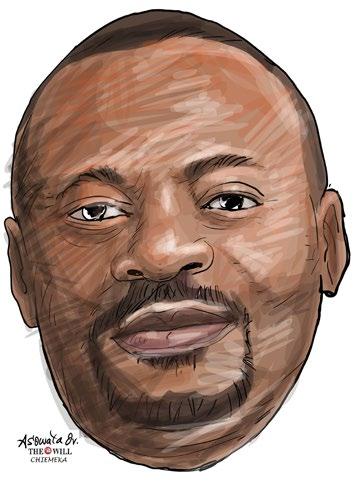
Trading in the top three equities namely Zenith Bank Plc, Fidelity Bank Plc and Access Holdings Plc (measured by volume) accounted for 451.558 million shares worth N13.583 billion in 10,055 deals in the first trading week for March, 2025.
The three tier-one bank stocks collectively contributed 24.84% and 28.76% to the total equity turnover volume and value respectively.
A total turnover of 1.818 billion shares worth N47.226 billion in 64,222 deals was traded last week by investors on the floor of the Exchange, in contrast to a total of 1.848 billion shares valued at N51.387 billion that exchanged hands in the previous week in 63,090 deals.
The Financial Services Industry (measured by volume) led the activity chart with 1.260 billion shares valued at N27.817 billion traded in 29,800 deals; thus contributing 69.31% and 58.90% to the total equity turnover volume and value respectively.
The Consumer Goods industry followed with 123.336 million shares worth N3.069 billion in 7,793 deals.
Third place was the Services Industry, with a turnover of 118.931 million shares worth N832.602 million in 3,730 deals.
The NGX All-Share Index and Market Capitalization depreciated by 1.19% and 0.71% to close the week at 106,538.60 and N66.717 trillion respectively.
For the daily trading on Friday, March 7, the major banking stocks also took the biggest pie of the trading volumes as investors position for the earning season that rules the first quarter. At the end of the last weekday of trading, a total of 349,185,222 shares in 11,911 deals, corresponding to a market value of N9,735,579,005.27, were traded.
EDITOR Sam Diala
DBN Channels Over N272bn to Womenowned EnterprisesOkpanachi
The planned construction of 7,000 telecom towers across Nigeria’s rural communities, as recently approved by the Federal Government, is a delightful development, and it’s coming at the most opportune time. This is because the project will accelerate Nigeria’s sluggish financial inclusion performance recently reported as the slowest among its African peers.
Financial inclusion means bringing the unbanked, that is those who are currently not enjoying financial services -- such as savings, deposit, credit, payment, pensions, insurance, remittances amongst others -- into the financial system. By so doing, they enjoy access to, and use of such services, for economic empowerment and other activities that better their lots towards national development.
The results of the Enhancing Financial Innovation & Access (EFInA) survey on ‘Access to Financial Services in Nigeria 2012’, showed that 34.9 million adults representing 39.7 per cent of the adult population were financially excluded. Only 28.6 million adults were banked representing 32.5 per cent of the adult population.

EFInA is a financial sector development organisation that promotes financial inclusion in Nigeria. To address the anomaly, Nigeria instituted the Financial Inclusion Strategy specifically, the strategy aims to provide the blue print that will guide and support stakeholder activities in advancing financial inclusion in the country. It endeavours to present a comprehensive picture of the activities and maps out modalities for coordination, complementarity and synergy among the stakeholders, as well as the periodic performance review.
Nigeria put in place specific milestones and deliverables to evaluate its performance towards achieving its financial inclusion objectives.
100,000 adults in 2020.
Despite Nigeria’s robust financial inclusion strategy, a recent report by the FT Partners’ Fintech Industry Research revealed that Nigeria and nine others lead African countries with the most unbanked population in 2024.
According to the report, in Nigeria over 117 million people remain unbanked, followed by Egypt with 79 million people, Ethiopia with 66 million, Tanzania 31, and Morocco 21 million people.
Others include Uganda, Cote d’Ivoire, Kenya, Ghana and South Africa reporting 16 million, 14 million, 11 million and 9 million people respectively.
The report cited lack of trust, in the banking system, a deep-rooted preference for cash, and lack of infrastructure in rural communities as hampering past efforts to bring consumers into the formal banking system.
Despite Nigeria’s fast-growing financial sector, and digital banking revolution, a significant portion of the population remains unbanked. The report noted that the expanding mistrust against the banks was also due to inefficient operations often attributed to “network challenge” which frustrate the operations of the new fintech firms to expand their operations into the rural areas.
Compared with the previous NGX trading day (Thursday, March 6), Friday’s data shows 7% decline in volume, 4% decline in turnover, but 4% improvement in deals.
In the aggregate, 126 NGX listed equities participated in trading, ending with 34 gainers and 18 losers.
Zenith Bank recorded the highest volume of
Continues on page 35
First the target set for the strategy nationally was to reduce the percentage of adult Nigerians that does not have access to financial services from 46.3 per cent in 2010 to 20 per cent in 2020 – as the population grows. Equally, the strategy projected that 70 per cent of adult Nigerian’s should have access to payment services in 2020, 60 per cent to savings and 40 per cent each to credit, insurance and pensions.
In order to achieve the above targets, the channels through which people can access the services such as branches of banks,microfinance banks, number of ATMs, mobile agents, PoS, agents of deposit money banks are also expected to increase to specified numbers per
TIJANI EXPLAINED THAT THE FEDERAL EXECUTIVE COUNCIL (FEC) APPROVED THE CONSTRUCTION OF THE NEW 7,000 TOWERS AS PART OF A BROADER STRATEGY BY THE CURRENT ADMINISTRATION TO
Experts say the recent penetration by fintech platforms such as Opay, MoniePoint, Palmpay and others into the rural areas has boosted Nigeria’s digital banking activities resulting in the country recording a record N1.07 trillion e-payment transactions in 2024, according to Nigeria Inter-Bank Settlement System (NIBSS).
The digital banking infrastructure builder explained that the volume of transactions processed by it for the year also jumped from 9.7 billion in 2023 to 11.2 billion in 2024 representing a 15.5% increase in the volume of electronic transactions year on year. The expansion reflected in the surge in PoS activities.
While commercial banks had been the major drivers of PoS terminal availability in the past, the entrance of fintechs into this space has seen the number of PoS devices in the market grow




astronomically.
In 2024, NIBSS data showed that the number of PoS terminals deployed across the country more than doubled to 5.5 million from 2.4 million recorded at the end of 2023. This represents a 129% increase. For a fintech like PalmPay, the deployment of PoS through agents was part of the company’s strategic plans to drive financial inclusion in Nigeria.
“This mission has fueled our efforts in deploying more PoS terminals across the 774 local government areas in the country,” the company said.
While the fintechs are moving in an aggressive manner, the banks are also overhauling their systems as the telecom companies embark on upgrading their payment service banking facilities.
“This is why it is necessary to have an efficient telecom service system in the country through the expansion of their masts and base stations into the rural areas,” said Benedict Okpala, a fintech specialist.
In response to the challenge, the Federal Government has announced plans to build 7,000 new telecom towers in rural areas to expand access to telecommunications services and improve digital connectivity across the country.
The Minister of Communications, Innovation, and Digital Economy, Dr. Bosun Tijani, who made this disclosure when he led a team of Airtel Nigeria on a visit to President Bola Tinubu at the Presidential Villa in Abuja, stressed the commitment of the government to ensuring that all Nigerians, particularly those in rural areas, have access to quality telecommunication services.
According to him, the plan by the government to invest in rural infrastructure aligns with the administration’s broader goal of improving economic opportunities for all citizens.
He said: “The priority for this government is meaningful
access. We don’t want our people to just have access to telecommunication services; we want it to be of high quality. That is why the NCC has been working thoroughly to ensure that we shift the focus not just to quality of service, but to quality of experience.”
Tijani explained that the Federal Executive Council (FEC) approved the construction of the new 7,000 towers as part of a broader strategy by the current administration to bridge the digital divide between urban and rural areas nationwide. He said the investment would complement the government’s ongoing deployment of 90,000 kilometers of fiber-optic cables across the country.
The three key elements of financial inclusion include institutions (such as banks, fintech firms, insurance companies), the enablers (the telecommunication facilities) and the products (the customized services offered by the institutions). The emergence of telecom sector in Nigeria created the window for enhanced financial inclusion strategy.
Industry experts say, the telecom firms, as the enabler and central to the buoying digital economy, are the inevitable drivers of the rapidly expanding fintech ecosystem and the aggressive financial inclusion strategy.
Amid the aggressive expansion, it is of utmost priority that the telecom industry is effectively regulated. Without professional regulation, the upcoming 7,000 towers would not justify their purpose.
“Beating the telecom operators into the path of professionalism, efficiency and playing by the rules a one measure the NCC has pursued without reservation to put the telecom industry in a position it should serve the purpose required of it,” Mike Akhigbe, a telecom specialist had told THEWILL
*Continues online at www. thewillnews.com

The Development Bank of Nigeria (DBN) has said it channelled N272 billion of its facilities through women-owned entrepreneurs that favoured over 518,170 of them.
The financial support accounts for 74% of the bank’s total beneficiaries, underscoring DBN’s commitment to empowering female entrepreneurs across the country.
Tony Okpanachi, DBN Managing Director announced this last week in Abuja during the bank’s event to celebrate the 2025 International Women’s Day – the sixth in the series.
He stressed that by supporting female-led enterprises across sectors such as fashion, agribusiness, and technology, the bank is further facilitating economic growth and development in Nigeria.
Okpanachi said for the bank, gender inclusion is more than just a commitment but a strategic imperative.
“We do not just believe in women’s economic empowerment—we are funding it, enabling it, and scaling it. Over the years, we have taken deliberate action to ensure that more women-led businesses have access to financing and capacitybuilding programmes.
“To date, DBN has disbursed over N272 billion to more than 518,170 women-owned businesses, which account for 74% of the bank’s beneficiaries. This reflects DBN’s unwavering commitment to empowering female entrepreneurs across the nation.”
He said this year’s celebration, under the theme

42.2 million traded shares for the day, followed by Fidelity Bank (35.9m), Access Holdings (31.5m) and United Bank for Africa (24m).
Regarding the performance of NGX market indices, the benchmark NGX All-Share Index (ASI) pared 242.12 (-0.23%) points to close at 106,538.60.
Market capitalisation stood at N66.7 trillion.
This constitutes a 1-week loss of 1.19%, a 4-week gain of 0.57%, and an overall year-todate gain of 3.51%.
Analysts at Proshare noted that last week’s market activities were tilted towards the fixed-income market, with the issuance of Treasury bills, OMO bills, commercial papers, and FGN Savings bonds.
The expected low interest rate has sparked issuers’ interest in short-term instruments. Across the offers, stop rates were lower than previous auctions but remained in double digits.
The stock market had only one offer, Wema Bank, which announced a rights issue of 14,286,785,417 ordinary shares for N10.45k per share based on two (2) new ordinary shares for every three (3) ordinary shares held as of
March 5, 2025, in line with its recapitalisation plan.
Analysts at CardinalStone anticipate that the bearish sentiment that surfaced in the final week of February 2025 may extend into March if the market continues to appear overbought.
This insight was shared in their economic update titled “Mixed Sentiments Across Global Equities; Bullish Momentum Prevails on the Local Exchange,” published on March 3, 2025.
They noted that panic selling in March could likely drag the weighted All-Share index down: “In March, the bearish sentiments that emerged towards the end of February are likely to spill over into the month, as profit-taking seems to be triggering panic selling.”
Despite this, they believe that such sell-offs might present buying opportunities for investors looking to purchase fundamentally sound stocks at lower prices.
Additionally, they emphasized that the upcoming release of FY’24 earnings and dividend announcements from both banking and non-banking entities is expected to significantly impact market conditions.
“Accelerate Action,” is not just a call to recognize women’s invaluable contributions, but a time to move beyond dialogue and take deliberate, measurable, and bold steps to bridge the gender gap in entrepreneurship, finance, and leadership,” Okpanachi stated.
Over the years, the bank has taken deliberate actions to ensure that more women-led businesses have access to financing and capacitybuilding programs.
The bank’s targeted financing has supported female entrepreneurs in diverse sectors, including fashion, agribusiness, technology, trade, healthcare, and renewable energy, ensuring they contribute meaningfully to the economy.
According to Okpanachi, the bank has since moved beyond access to finance alone – which is not enough – to pushing them through strategic partnerships, policy support, mentorship, and market access to thrive in an increasingly competitive world.
One of the bank’s recent milestones is the Women Entrepreneurs Finance Initiative (WE-FI) Code, a landmark partnership with the Central Bank of Nigeria (CBN) and the Bank of Industry (BOI) aimed at enhancing women’s access to finance, capacity-building, and business networking.
According to him, this initiative underscores their commitment to creating a gender-inclusive financial ecosystem that enables women-owned businesses to thrive.
He noted that women entrepreneurs play a critical role in Nigeria’s economic transformation, in terms of driving innovation,

resilience, and prosperity, powering over 21 different sectors of the economy.
Yet, female entrepreneurs face steeper challenges, including limited access to finance, structural barriers, and fewer growth opportunities.
Okpanachi emphasized that removing barriers and accelerating the success of women entrepreneurs will be crucial for driving an inclusive and thriving economy
According to him, action must be intentional, bold, and sustained in a collaborative manner, going forward.
He urged the government to accelerate policies

that dismantle systemic barriers for women in business, ensuring that gender inclusion is embedded in national economic policies.
He emphasized that financiers and investors must reassess traditional risk evaluation methods and boost funding for women-led businesses across all stages of development.
He encouraged the private sector to actively support and procure from female-owned businesses, ensuring that our supply chains reflect diversity and inclusion.
Assuring women entrepreneurs of DBN’s continued support, through financing, capacitybuilding, and advocacy, he urged them to think big, innovate boldly, and take their businesses to new heights.
“At DBN, we stand firm in our mission to catalyze economic growth by accelerating women’s success.
“We are not just funding businesses; we are shaping a future where women’s leadership, success and growth are the norm, not the exception,” he stated.
The event was attended by prominent figures, including the Honourable Minister of Trade and Investment, Dr. Jumoke Oduwole, represented by Hajara Usman, and the French Ambassador to Nigeria, Marc Fonbauscier.
The minister’s representative, Hajara Usman, highlighted the importance of supporting women entrepreneurs in Nigeria. Hajara highlighted that empowering women in business is crucial for the nation’s economic growth and development.

BY VICTOR ALIKOR
Real estate in Nigeria is on its growth trajectory. Real estate is Nigeria’s 3rd largest sector ahead of oil and gas. Smart investors, the elites, the political class, and the higher-income class keep a close peep on the growth of the sector. The “real estate gamble” has proven to be a worthy return on investment.
Although strong concern remains as there seems to be a growing number of unoccupied buildings in major Nigerian cities while over 24.4 million Nigerians lack access to affordable housing, the highest globally. Why is this quagmire on the rise?
Investment in real estate is a reliable safety net for asset storage. The sector draws speculations as those with deep pockets have identified a good alternative to store wealth, especially with land banking and flipping.
At least, its time value offers a higher return on investment than the interest rate on savings from deposit money banks. Real estate offers an unmatched value for money and less volatility than other investment options.
Less privileged Nigerians remain in the shackles of poverty, struggling to meet their hunger needs and basic necessities, and are less likely to take investment risks.
Real estate is a trusted means of transgenerational wealth transferIt is a futuristic guarantee for wealthy protection across generations, especially when Nigeria’s business environment is volatile, unpredictable, and could be disruptive. Purchasing power is low, and businesses are stifling and shutting down in numbers.
Real estate assures investors of continuity. Real estate offers prestige, class difference, and social capital for investors. The more land and physical infrastructure acquired, the greater social status one assumes in the society. This is an age-old traditional practice in Nigeria. Asset acquisition and ownership equal certain social status and rights in society.
In 2025, a post-election year to 2023 and a preelection year to 2027, many political players could consider storing their assets in real estate. Real estate affords political actors access to credit worthiness from lenders if the need arises. It presents a viable collateral to close associates for bargains.
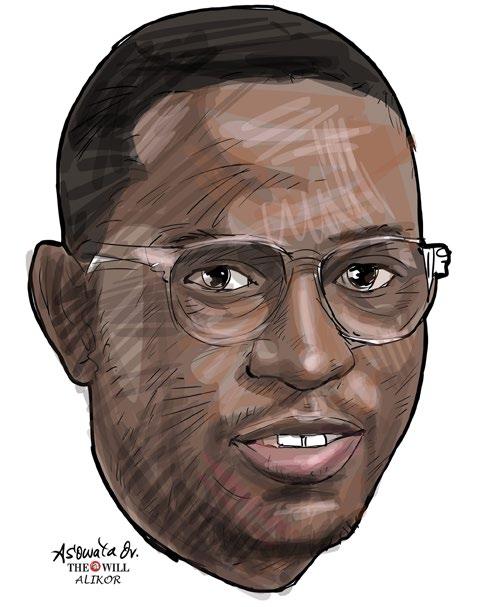
Another key factor is diaspora ownership.
The devaluation of the naira implies that Nigerians in the diaspora can own property even though they are less likely to occupy these properties due to uncertain security and livability concerns even in major cities in Nigeria.
High rental costs in the midst of low purchasing power among Nigerians is another contributing factor. Many properties are vacant as prospective occupants are reluctant due to the high cost of rent and maintenance. This is exacerbating housing constraints in major cities in Nigeria.
Some investors speculate on political, social, and economic uncertainties and are hesitant to return and occupy this property.
Poor urban planning is another contributing factor. Overcrowding and lack of basic infrastructure in cosmopolitan cities are fuelling these ‘Buy-and-Not-Stay’ cultures in Nigeria.
Insecurity is a challenge as it exposes the rich as prey to criminals who have flooded Nigeria’s capital city, Abuja, due to insecurity concerns in neighbouring states. How can we address this challenge?
The government is proposing taxes on owners of unoccupied houses. Could this be the game changer? I don’t think so. The policy impact will be minimal or ineffective. Data poverty and privacy concerns are major hindrances
to knowing exactly the number of unoccupied houses and who their owners are.
Sometimes, property owners could purchase houses using proxies, especially for politically exposed persons and high-net-worth individuals. What are other significant and more effective alternatives to address the challenge?

The government must address inflation, exchange rate devaluation, and the widening inequality gap in Nigeria. Provide funding options to middle-income Nigerians to own properties and homes through rent-toown schemes, building low-cost houses in semi-urban locations. Rehabilitate slums, shanties and provide infrastructure in rural communities.
The government must declare a state of emergency on affordable housing in Nigeria. The federal and state governments must provide more innovative strategies similar to the Ministry of Finance Incorporated (MOFI) Real Estate Investment Fund (MREIF) of N250 billion to plug the gap.
The budgetary allocation on housing must be expansive and sufficient to accommodate more Nigerians through the mortgage banks and wholesale impact funds to catalyse growth in the sector.
It requires more than just pronouncement but political will to solve these challenges as shelter remains a basic need for good human existence. Real estate now offers a greater contribution to Nigeria’s Gross Domestic Product (GDP) and employment generation. It deserves more of the government’s attention than ever.
•Alikor is a development economist

Sometimes, property owners could purchase houses using proxies, especially for politically exposed persons and highnet-worth individuals

BY EMMANUEL ASIKA
Technology has always been the great equaliser, but artificial intelligence (AI) is proving to be the most transformative force yet. From predictive analytics to generative models reshaping industries, AI is not just a tool—it’s the next frontier.
As the world scrambles to harness its potential, the critical question is: will Africa merely be a consumer of AI, or can it carve out a meaningful role in shaping its evolution?
THE AI BOOM: A TSUNAMI OR A LIFELINE?
The AI industry is exploding. McKinsey projects AI could contribute up to $15.7 trillion to the global economy by 2030. The rush for AI dominance is underway, with major players investing heavily in research, infrastructure, and talent.
Meanwhile, Africa finds itself in a familiar position—on the periphery of a technological revolution that could either accelerate economic growth or widen the digital divide. For many African nations, the biggest challenge remains access—access to AI tools, computing power, and, most importantly, AI education. Without deliberate efforts to integrate AI into our economies, Africa risks becoming a passive consumer rather than an active innovator. But there’s an opportunity to change this narrative.

THE CASE FOR AFRICAN-LED AI INNOVATION
Africa is home to some of the world’s fastestgrowing internet economies, a thriving fintech space, and a youthful population ready to embrace digital tools.
The continent’s tech hubs, from Lagos to Nairobi, are proving that innovation is not exclusive to Silicon Valley. The rise of AI startups like InstaDeep (acquired by BioNTech) and data-driven solutions for agriculture and healthcare signals that Africa is not waiting to be invited to the AI table—it’s already pulling up a chair.
However, for Africa to move from participation to leadership in AI, it must address three critical areas: talent development, infrastructure, and ethical AI regulation.
TALENT DEVELOPMENT: FROM CONSUMPTION TO CREATION
A 2022 report by the World Economic Forum found that Africa has fewer than 25,000 AI specialists—a fraction of the 300,000 AI experts in North America alone. This talent gap underscores the urgency of integrating AI

education into curricula at all levels.
The work we’ve done through initiatives like the MannyVille Series and Single Click Academy proves that when young Africans are given the right tools and exposure, they don’t just learn—they innovate. The focus must now shift to scaling AI literacy through universities, boot camps, and corporate-backed training programmes.
INFRASTRUCTURE: BUILDING THE AI BACKBONE
AI is data-intensive. Without investment in cloud computing, data centres and robust internet infrastructure, African developers will struggle to compete. Countries like Rwanda and Kenya are already making strides in AI infrastructure, but broader public-private partnerships are needed to democratise access.
Tech giants and local enterprises must collaborate to ensure affordable computing power so AI research and deployment aren’t stifled by high operational costs.
ETHICAL AI AND LOCALISED SOLUTIONS
The global AI conversation is heavily Westerncentric, with solutions often designed without consideration for African realities. AI models trained on biased datasets don’t just fail—they perpetuate inequalities.
The opportunity for Africa is to lead in ethically grounded AI, ensuring that algorithms are trained on diverse datasets that
reflect the continent’s linguistic, cultural, and economic diversity.
Regulation must also strike a balance— encouraging innovation while ensuring AI doesn’t become another tool of exclusion.
THE PATH FORWARD: FROM AI CONSUMERS TO AI CONTRIBUTORS
Africa’s digital transformation is no longer about catching up; it’s about stepping into leadership. Governments must create policies that attract AI investment while fostering local innovation. Businesses must see AI as an enabler, not a threat, and invest in training their workforce.
The broader society must engage in the AI discourse, demanding solutions that address African challenges rather than merely importing foreign tech.
THE FUTURE IS NOT JUST DIGITAL—IT IS INTELLIGENT
The world is moving toward an AI-driven future, and Africa cannot afford to be a spectator. The choices we make today will determine whether AI serves as a bridge to prosperity or a deepening of existing divides. We must be intentional about who builds AI, how it is built, and who benefits from it.
At the recent TechEx conference, a young innovator asked me, “How do we ensure AI works for Africa?” My answer was simple: We build it. The tools are available, the talent is emerging, and the need is urgent. AI isn’t just the next frontier; it’s Africa’s opportunity to lead. Let’s not miss it.
•Asika is a business leader, digital equity advocate, and industry strategist.
As the world scrambles
to harness its potential, the critical question is: will Africa merely be a consumer of AI, or can it carve out a meaningful role in shaping its evolution?
Photo Editor: Peace Udugba [08033050729]


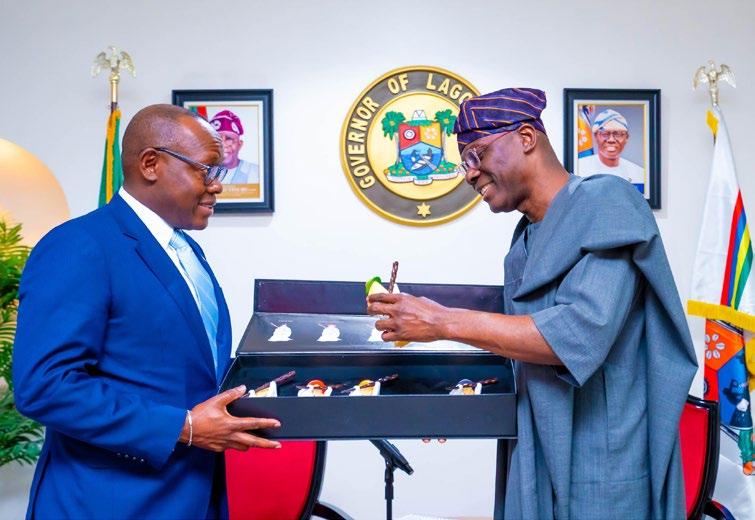
Prime Minister of
Hon. Isaac Chester Cooper, receiving an
from Governor
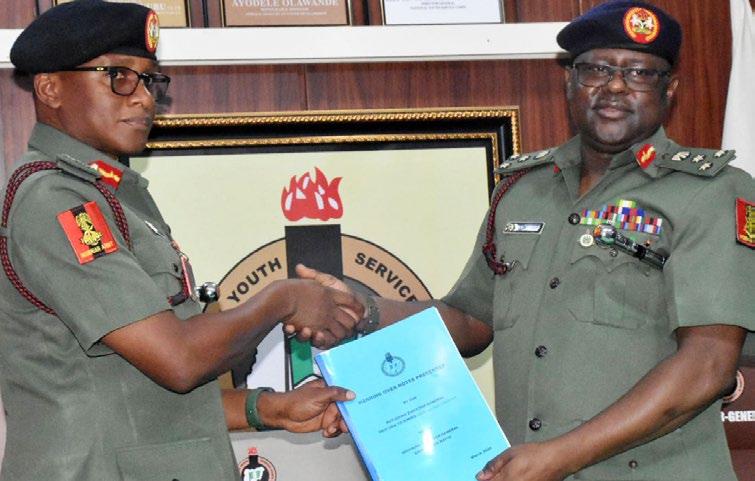







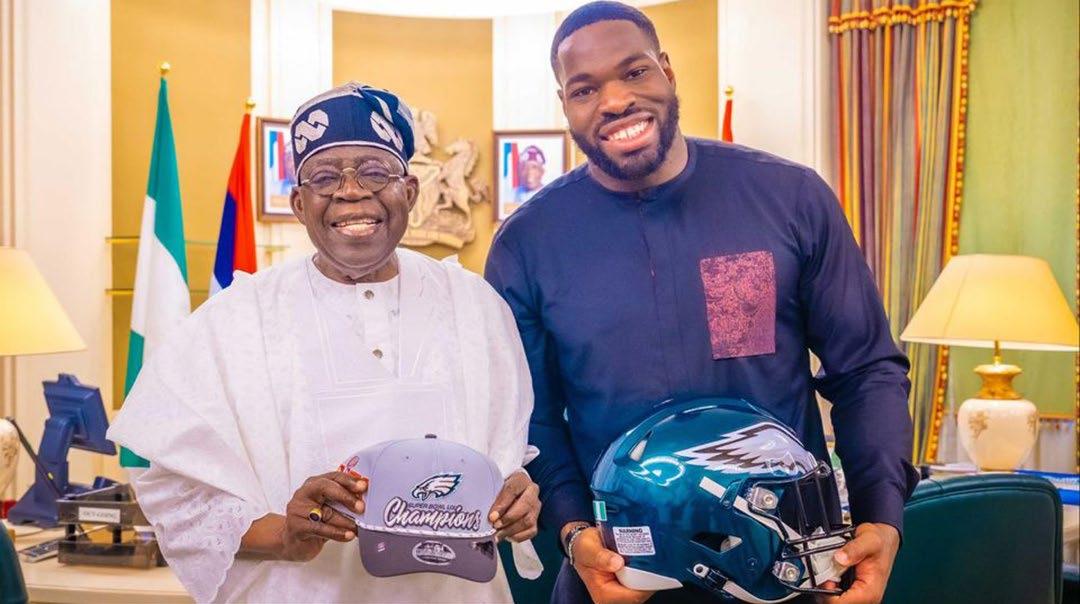
BY JUDE OBAFEMI
Morotoluwa Ojomo, a Nigerian-born athlete, visited President Bola Ahmed Tinubu on February 28, following his Super Bowl victory with the Philadelphia Eagles. This meeting, held at the State House in Abuja, marked a significant moment for Nigerian sports. Ojomo’s journey from Lagos to the National Football League (NFL) highlights the potential of Nigerian athletes on the global stage. His plans to establish a sports academy in Nigeria aim to inspire and develop future talent.
To examine the importance of his visit, the role of the Nigerian Government in sports development and the potential for Nigeria to benefit from its diaspora athletes to strengthen its sporting system. This goes back to where it all began. Ojomo’s story begins in Lagos, where he was born in 2001. His family moved to the United States in 2009 when he was seven years-old.
Growing up in Texas, he developed an interest in American football, a sport not widely played in Nigeria. He attended the University of Texas, where he played 50 games over five seasons, recording 95 tackles and five sacks. His performances earned him recognition and in 2023, the Philadelphia Eagles selected him in the seventh round of the NFL Draft. On February 9, Ojomo contributed to the Eagles’ 40-22 victory over the Kansas City Chiefs in Super Bowl LIX, held in New Orleans. He recorded

two tackles, including one for a loss, helping his team to their second Super Bowl title. After the win, he displayed the Nigerian flag, a gesture that caught attention back home.
The visit to President Tinubu came less than three weeks after the Super Bowl. Ojomo arrived in Nigeria on February 25, accompanied by his parents, Ololade and Bimbo, and his sister, Modele. The meeting at Aso Rock included Abike Dabiri-Erewa, Chairman of the Nigerians in Diaspora Commission (NIDCOM), who facilitated the visit. Tinubu welcomed Ojomo warmly, praising his determination and focus. He noted that Ojomo’s success demonstrated what Nigerians could achieve worldwide. The President urged him to mentor young athletes in Nigeria, suggesting that his experience could help develop talent locally. Ojomo presented Tinubu with a signed Eagles helmet and a Super Bowl champions hat, symbols of his achievement and his connection to Nigeria.
This encounter was more than a ceremonial event. It highlighted the growing influence of Nigerian athletes in international sports, particularly in the NFL, where over 30 players of Nigerian descent have competed in recent years. Ojomo’s visit brought attention to the potential for collaboration between Nigeria’s government and its diaspora. Tinubu’s comments reflected an interest in engaging with successful Nigerians abroad to benefit the country. Lagos Governor Babajide Sanwo-Olu had earlier congratulated Ojomo on February 10, calling him a Lagos-born talent and noting that his success inspired pride across Nigeria. The involvement of both state and federal leaders suggested a unified effort to celebrate and possibly build on Ojomo’s accomplishments.

Ojomo shared his vision during the visit. He plans to establish a sports academy in Nigeria focused on American football, with the goal of providing opportunities for young people. He believes the sport offers a pathway to education, including high school and university degrees, as well as a chance to compete globally. He also aims to promote flag football, a non-contact version of the game, with an eye toward qualifying Nigerian teams for the 2028 Olympics, where the sport will debut. Ojomo told reporters that the most important thing was giving our youths an opportunity to get into American football. It was a pathway to make Nigeria bigger on a worldly view. His own journey supports this idea. He credits his Nigerian upbringing for the determination that led to his NFL success, saying, he would not be here

without Nigeria.
The Nigerian Government’s role in sports development remains a critical factor. Tinubu’s administration has stated its commitment to human capital development, with a massive 2025 budget intended to prioritise economic stability and youth empowerment.
However, sports funding has historically been inconsistent. Football, which Americans call “soccer”, dominates the sporting landscape in Nigeria, receiving the bulk of attention and resources. American football, by contrast, has little presence, with no established leagues or infrastructure. Ojomo’s academy could introduce the sport to a wider audience, but its success depends on government support. Tinubu’s encouragement of Ojomo suggests an openness to new ideas, yet past governments have struggled to turn words into action.
Sports facilities across Nigeria often lack maintenance, and grassroots programmes are limited. Collaboration with the private sector could address some of these gaps. Ojomo’s initiative might benefit from partnerships with businesses or international organisations, reducing the burden on public funds. His status as an NFL champion gives him credibility to attract investment. However, challenges remain.
Establishing an academy requires land, equipment, and trained coaches, all of which involve significant costs. Bureaucratic delays and corruption could also slow progress. Ojomo acknowledged these difficulties indirectly acknowledging that the grass is not greener where you go; it is greener when you water it. His position implies a need for effort and investment to make his vision work in Nigeria.
Nigerians in the diaspora offer a valuable resource for sports development. Athletes like Ojomo, along with others, such as C.J. Uzomah and Charles Omenihu in the NFL, or stars in basketball and athletics, demonstrate the talent pool available. Over 60 percent of Nigeria’s population is under 25, providing a large group of potential athletes. A structured programme to identify and train young talent, with guidance from diaspora professionals, could transform the country’s sporting future.
NIDCOM’s involvement in Ojomo’s visit indicates that the Federal Government recognises this potential. Dabiri-Erewa praised his commitment to uplifting Nigerian youth and announced plans to honour him, suggesting official backing for his efforts.
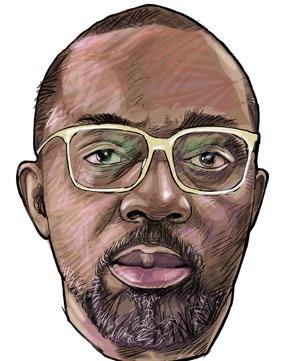

ogannah@thewillnews.com
On10 June 2020, Ramon Abbas, aka Hushpuppi, the infamous online celebrity, found himself in handcuffs in Dubai. For years, he had flaunted a life of private jets, luxury cars and designer clothes across social media, all without any visible means of earning such wealth. His arrest revealed a fortune built on cybercrime—millions stolen through scams. In Nigeria, where he once lived, many believe he would still be free today, celebrated rather than incarcerated.
Fast forward to 2025: Sophia Egbueje, a female believed to be in her late 20s or early 30s, linked to musician Burna Boy, has been a talking point lately over claims suggesting that he broke a promise to give her a Lamborghini in exchange for sex, only to back out after the deed.
In the leaked phone conversation that Sophia had with her friend, she suggested engaging in transactional sex. When a video emerged of her taking delivery of the car anyway, her supporters cheered. Only a few asked how she paid for it. These two stories, although several years apart, point to a troubling truth: Nigerian society no longer cares where money comes from, just get rich. This is indeed very troubling.
This attitude poisons the country in ways that touch every corner of life. Hardworking people—those who rise early for a nine-to-five job or toil in small businesses—watch their efforts dwarfed by neighbours with no apparent trade driving luxury cars and ‘Livin’ da loca’.
A teacher earning N150,000 a month sees a jobless youth next door move into a mansion. The honest worker struggles to feed his family, while the flashy spender throws parties and buys loyalty with cash. Society does not question the source; it claps for the display. Over time, this wears people down. Some, desperate to keep up, dip their hands into office funds, public money or engage in fraud. Others, unable to bear the shame of poverty beside such wealth, take their own lives. The Nigerian Bureau of Statistics reported a rise in suicide cases in recent years, though it avoids linking this to economic pressure. To me, the connection seems to lie somewhere in between.
The damage stretches beyond individuals to the next generation. Children grow up watching their parents scrape by on honest wages, while others, with no identifiable work, live like stars.
An undergraduate sees a classmate drop out of school, starts posting pictures with bundles of cash and soon drives a Mercedes Benz. The lesson sinks in: hard work brings hunger, shortcuts bring glory. Parents notice this shift but often stay silent. Worse still, some encourage it.
Back in the 1990s, families in Benin City, Edo State pushed their daughters to migrate to Italy, knowing many would end up in prostitution. That trade built a reputation for the region that lingers today. Now, the pattern repeats with a modern twist. A son or daughter returns home in a Range Rover, showering their parents with money and no questions follow. Where did it come from? How does a 25-year-old with no business afford this?
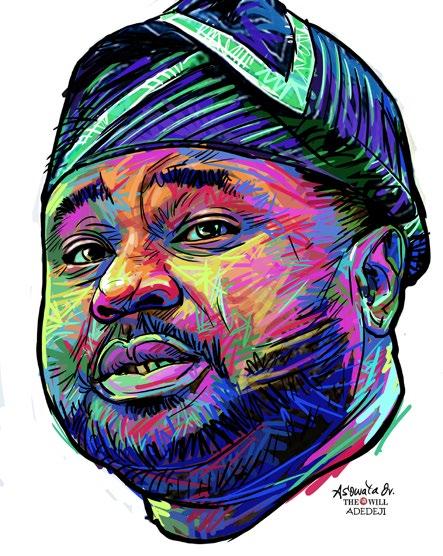
The tax authorities should be the ones asking these questions. The Federal Inland Revenue Service exists to ensure citizens and businesses pay what they owe based on their income. State tax agencies play a similar role. Yet, when a story like the Lamborghini lady’s goes viral, they do nothing. No officer knocks on her door to congratulate her on the car and ask how she earned it. They do not check her tax records, bank records or demand proof of her profits.
In a country where tax compliance remains low—Nigeria collects less than 6 percent of its GDP in taxes, compared to over 25 percent in places like South Africa—this inaction stands out. If the tax bodies investigated every loud display of wealth, they could uncover fraud, recover unpaid taxes and send a message. They have the power to work with the police if crimes emerge, but inertia holds them back. Corruption might play a part too—some officials may fear the powerful or prefer bribes over duty.
This failure fails our society. People with questionable money keep flaunting it and the honest keep fading into the background. The youth watching this will not settle for the slow grind of a lawful life. They will chase the fast track and tomorrow’s Nigeria will inherit a generation bolder in dubious activity and more reckless in flaunting ill-acquired wealth than today’s.
Parents bear some blame here. Many parents happily take cash from their children without asking how it was made. A mother might boast that her son or daughter
built her a house, ignoring that he/she has no job. If a neighbour raises an eyebrow, she fights back, claiming jealousy. This attitude fuels the problem. Until families demand answers, the cycle will continue.
The solution lies with the tax authorities stepping up. They need to target every public display of wealth that defies explanation. Imagine the Lamborghini lady opening her door to find tax officials saying ‘hello, are you Sophia…’. They ask simple questions: What do you do? How much did you earn last year? What tax did you pay? If her answers falter, they dig deeper. This would not just catch tax dodgers—it would scare others into paying up.
Over time, the fear of a knock from the taxman would quiet the loudest braggarts. Those who cannot explain their wealth, including the political class and elite, might face criminal charges, as the Constitution allows for prosecuting financial crimes against the state.
Citizens have a role too. People should report suspicious wealth around them. That neighbour with three cars and no job? The overnight millionaires and billionaires (They are actually a lot in this country). That so-called “influencer” posting private jet trips with no business to show for it? A quick tip to the FIRS or state tax office could start an investigation. If enough reports pile up, the authorities would have to act. Where evidence points to crime—fraud, theft, or worse—the case could shift to the police or Economic and Financial Crimes Commission. This would not fix everything overnight, but it would plant a seed. Society might start asking questions again: Where did the money come from? Why does it matter?
If the tax bodies do their job, the effect could ripple outward. Honest workers might feel less like fools for staying lawful. Parents might hesitate before praising a child’s unexplained riches. Youth might see that flaunting wealth invites scrutiny, not applause.
Nigeria could begin to heal from this poison that has seeped into its veins. The country has laws to punish tax evasion and crime—Section 24 of the Constitution demands citizens pay taxes, and other statutes criminalise ill-gotten gains. The tools exist; only the will lags.
Hushpuppi’s downfall in Dubai proved that unchecked wealth eventually meets its match when authorities care enough to look. In Nigeria, that care remains missing.
The Lamborghini lady’s story, like countless others, fades into the noise of celebration rather than inquiry. Until the FIRS and state tax boards wake up, the honest will toil in silence, the dishonest will shine, and the young will follow the wrong path. It does not have to stay this way. Citizens can demand action—report the questionable, pressure the authorities, and refuse to cheer the unearned.
Tax enforcement can shift the tide, but only if it starts now. Nigeria deserves a society that values sweat over swagger, and it falls on everyone to make that happen. Many parents happily take cash from their children without asking how it was made. A mother might boast that her son or daughter built her a house, ignoring that he/she has no job. If a neighbour raises an eyebrow, she fights back, claiming jealousy. This attitude fuels the problem. Until families demand answers, the cycle will continue.
Many parents happily take cash from their children without asking how it was made. A mother might boast that her son or daughter built her a house, ignoring that he/she has no job. If a neighbour raises an eyebrow, she fights back, claiming jealousy. This attitude fuels the problem. Until families demand answers, the cycle will continue